American History Tellers • Wondery

Episodes

The Ice King | Frozen Assets | 1
American History Tellers examines the early days of America's ice trade through the story of Frederick Tudor. After leaving school at 13 to work in retail, Tudor noticed an opportunity to transport New England's abundant ice to warmer climates, leading him to purchase a ship and establish a pioneering ice trading business.
The summary covers Tudor's first ventures in ice trading, including his failed attempt to sell ice in Martinique and his subsequent expansion to Havana. It also details the various obstacles Tudor faced, from the practical challenges of storing and transporting ice to broader issues like export restrictions during the Napoleonic Wars and mounting debts that eventually led to his arrest.
Dec 10, 2025
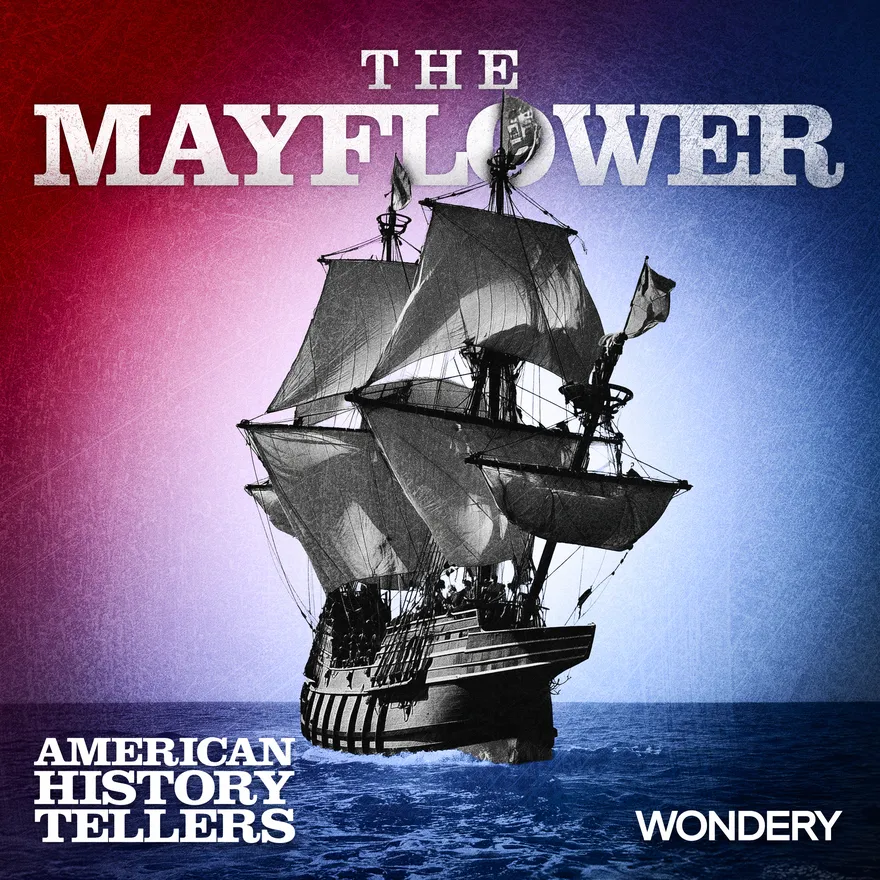
The Mayflower | The Thanksgiving Myth | 5
American History Tellers examines the relationship between the Wampanoag people and European settlers, revealing that their interactions began long before the Pilgrims' arrival in 1620. The episode details how European contact brought both trade opportunities and severe challenges to the Wampanoags, including slavery and devastating diseases, and explores the complex role of figures like Squanto in mediating between the two groups.
The episode also investigates the historical accuracy of the "First Thanksgiving" narrative. Through the research of historian David Silverman, it shows how the 1621 harvest celebration differed significantly from popular retellings, and traces how the initial Wampanoag-Pilgrim alliance deteriorated into conflict. The summary explains how these events culminated in King Philip's War, which had lasting consequences for the Wampanoag nation.
Dec 3, 2025

History Daily: The Assassination of Sergei Kirov
American History Tellers examines the 1934 assassination of Sergei Kirov, a prominent Communist Party leader in Leningrad, and its connection to one of Soviet history's darkest periods. The episode details how Leonid Nikolayev, a former party member, shot Kirov at the Smolny Institute, setting off a chain of events that would reshape the Soviet political landscape.
The summary explores how Joseph Stalin used Kirov's death as justification to consolidate his power through what became known as the Great Terror. Through forced confessions and show trials, Stalin eliminated political rivals like Zinoviev and Kamenev, while expanding his campaign of repression to target military leaders, clergy, and intellectuals. By 1938, this systematic purge had claimed up to one million lives through arrests, torture, and executions.
Dec 1, 2025
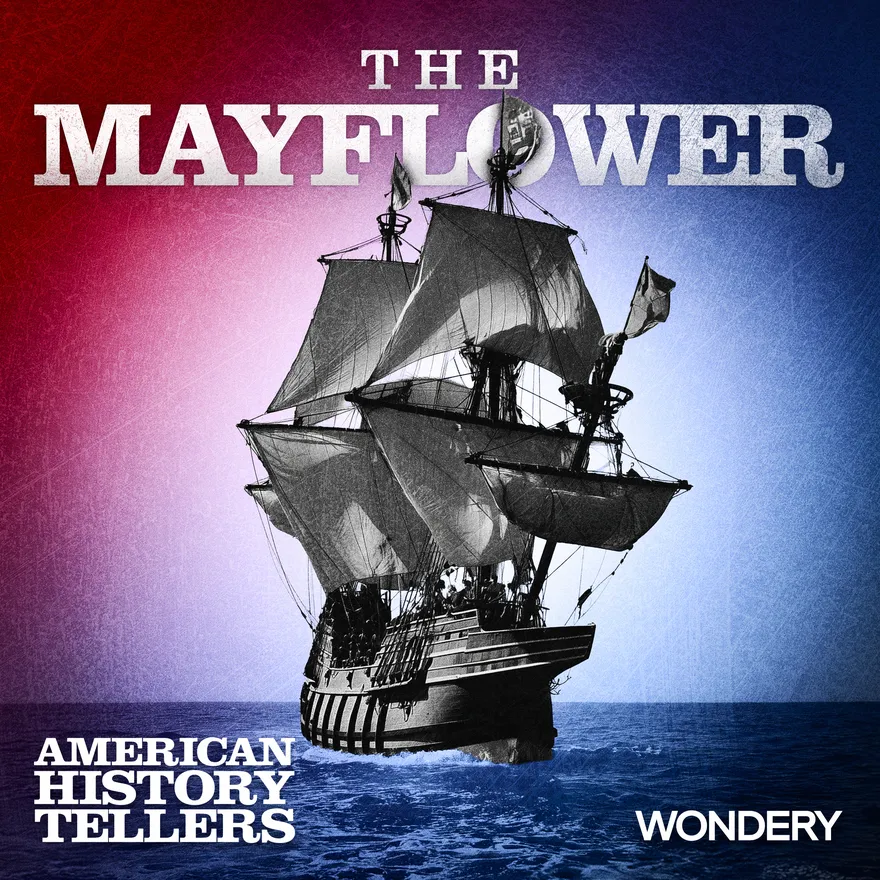
The Mayflower | Cutthroats | 4
American History Tellers explores a critical period in the Plymouth Colony's development, examining how the settlement dealt with severe food shortages and conflicts with Native American tribes. The episode details the colony's struggle to feed unexpected English settlers, their controversial military actions under Miles Standish, and Governor Bradford's eventual solution to food scarcity through the implementation of private land ownership.
The narrative also tracks Plymouth's path to economic stability, from their early losses to French pirates through their adoption of wampum as currency and success in the beaver fur trade. As the colony paid off its debts and prospered, new challenges emerged: community members began establishing separate farms, and the founding of Boston shifted regional influence away from Plymouth, testing Bradford's vision of a unified settlement.
Nov 26, 2025

History Daily: Darwin’s Origin of Species
American History Tellers examines Darwin's development of evolutionary theory, from his early observations aboard the HMS Beagle to the publication of "On the Origin of Species." The episode explores how Darwin's meticulous specimen collection and documentation, particularly in the Galapagos Islands, led him to question divine creation and develop his theory of natural selection.
The summary covers the immediate response to Darwin's work, including its rapid publication success and the debates it sparked within scientific and religious communities. It details how Darwin chose to let his writings speak for themselves while his allies defended his ideas, and how his careful approach to addressing criticism helped his theory gain acceptance in the scientific community, ultimately leading to his burial alongside Newton in Westminster Abbey.
Nov 24, 2025
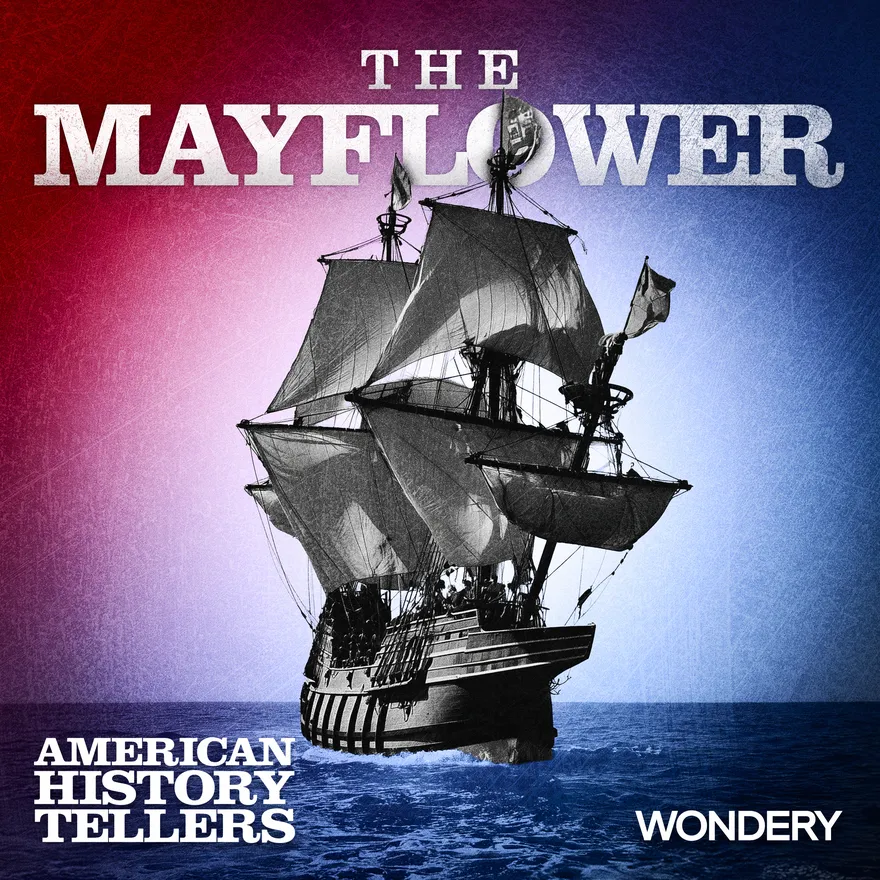
The Mayflower | The First Thanksgiving | 3
In this episode of American History Tellers, we learn about the struggles of the first Plymouth colonists in 1620, focusing on the devastating winter that claimed half their population as they faced disease, extreme cold, and limited resources. The Pilgrims' survival hung in the balance as both settlers and the Mayflower's crew battled illness, with the ship becoming a makeshift hospital in Plymouth Harbor.
The episode explores the formation of a crucial alliance between the Pilgrims and the Wampanoag tribe, facilitated by the English-speaking Native American, Squanto. Through this partnership, the colonists gained essential agricultural knowledge while offering military support to the Wampanoag. The summary also covers the colony's economic challenges with English investors, internal conflicts over religious practices, and diplomatic tensions that threatened their tribal relationships.
Nov 19, 2025
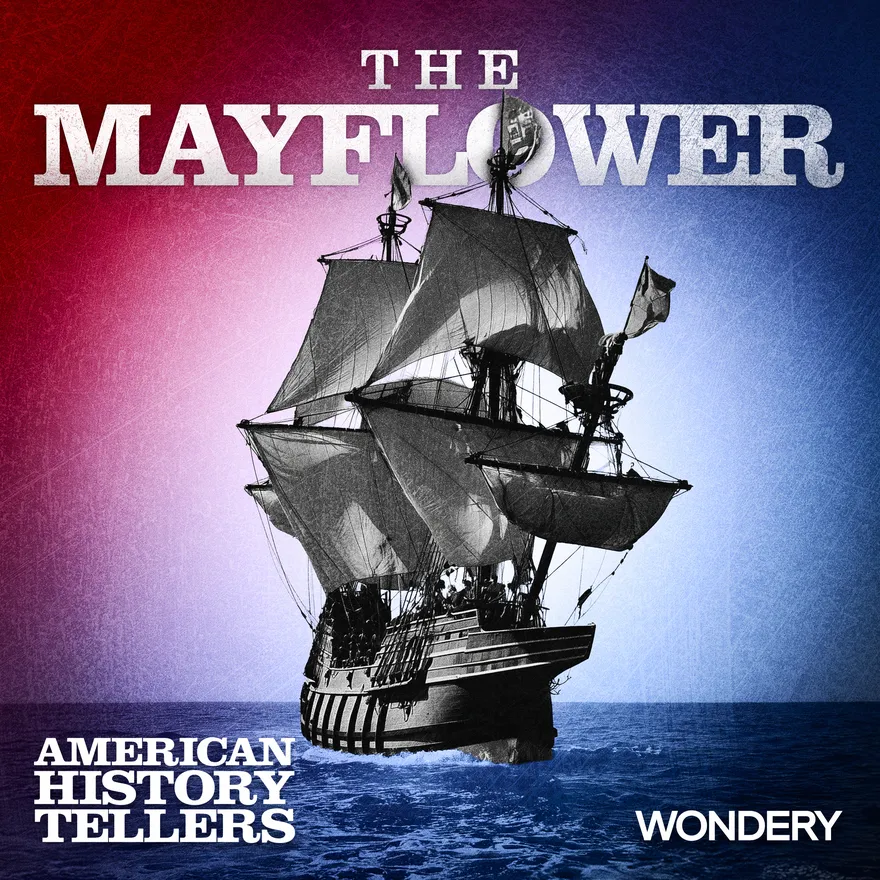
The Mayflower | A Sea of Troubles | 2
American History Tellers explores the challenges faced during the Mayflower's journey to the New World. The episode covers the 65-day voyage of 102 passengers, including both religious Puritan separatists and non-religious "strangers," as they endured storms, illness, and dwindling supplies while crossing 3,000 miles of ocean.
The summary examines the tensions that developed between passenger groups, leading to the creation of the Mayflower Compact, and describes the colonists' first interactions with Native American territories and peoples. It details the settlers' establishment of New Plymouth and their struggle against harsh winter conditions, disease, and death as they worked to build their settlement.
Nov 12, 2025

The Mayflower | Saints and Strangers | 1
American History Tellers explores the journey of the Puritan Separatists from England to the New World. Beginning with William Bradford's early life and religious awakening in Northern England, the summary traces how King James I's persecution of the Separatists drove them first to Holland and ultimately toward America. Their quest for religious freedom and cultural preservation led them to secure passage on the Mayflower.
The summary details the numerous challenges the group faced, from the abandonment of their second ship to conflicts between the religious Separatists and the non-separatist "Strangers" who joined their voyage. It examines their eventual arrival in New England—far from their intended destination—and their efforts to establish Plymouth Colony in harsh winter conditions while maintaining peaceful relations with native peoples.
Nov 5, 2025

Listen Now: Against The Odds | Tsunami In Thailand
American History Tellers examines the events of the 2004 tsunami in Thailand through the story of Watcheri Thangtay and her family in Nam Khem, a fishing village. The episode describes life in the peaceful coastal community before the disaster, where residents maintained a close relationship with the sea through fishing and beachfront living.
The summary focuses on the moments when the tsunami wave approached the shore, depicting Watcheri's experience as she noticed the unusual wave and attempted to protect her two daughters from its impact. Through her perspective, the episode illustrates the devastating force of the tsunami as it moved through the village, transforming the familiar landscape into unrecognizable terrain.
Nov 4, 2025

Shootout at the O.K. Corral | Vendetta | 4
American History Tellers examines the legal and personal aftermath of the O.K. Corral shootout in Tombstone, Arizona. The episode covers the complex legal proceedings that followed the incident, including conflicting testimonies from Sheriff Behan and Ike Clanton, and details how the case highlighted the town's deep divisions over the matter.
The summary also traces how the conflict escalated beyond the courthouse, leading to violent reprisals against the Earp brothers and Doc Holliday's eventual escape from Arizona. Through newspaper interviews and later media portrayals, these events transformed into cornerstone tales of the American West, though the real story involves more moral ambiguity than many popular retellings suggest.
Oct 29, 2025

Shootout at the O.K. Corral | Thirty Seconds | 3
American History Tellers examines the events leading to and following the famous 1881 gunfight in Tombstone, Arizona. The episode details how the Earp brothers—acting as lawmen—worked to protect the town from cowboy gangs while navigating complex local politics and personal rivalries, particularly with Ike Clanton and his associates.
The narrative covers the progression of tensions between the Earps and the cowboys, culminating in the deadly shootout on Fremont Street that left three cowboys dead and several Earps wounded. The summary explores the town's divided reaction to the violence, including a 300-person funeral procession for the fallen cowboys and Sheriff Johnny Behan's conflicted response, revealing how the incident created more problems for Tombstone rather than resolving existing ones.
Oct 22, 2025

Shootout at the O.K. Corral | Law and Disorder | 2
American History Tellers examines political corruption and lawlessness in 1880s Tombstone, Arizona. The episode details how fraudulent elections, particularly in the city marshal race, allowed criminal elements to maintain control over the town. At the center of this corruption was the rivalry between the Earp brothers and Johnny Behan, Cochise County's first sheriff, who formed alliances with local cowboy gangs.
The summary explores how these cowboy gangs terrorized the region through violent crimes and stagecoach robberies, shifting their focus from cattle rustling to more serious offenses. When Wyatt Earp attempted to capture the perpetrators of a major stagecoach robbery to boost his chances of becoming sheriff, his plan led to unforeseen consequences that heightened tensions between the Earps and Behan's faction, setting the stage for the confrontation at the O.K. Corral.
Oct 15, 2025
Create Summaries for anything on the web
Download the Shortform Chrome extension for your browser


Shootout at the O.K. Corral | The Road to Tombstone | 1
American History Tellers examines Wyatt Earp's journey from lawlessness to becoming a frontier lawman, beginning with his 1873 arrest of a gunman in Ellsworth, Kansas. The episode explores his roles as a police officer and marshal in multiple frontier towns, his friendship with Doc Holliday, and the circumstances that led him and his brothers to Tombstone, Arizona.
The narrative follows the rapid transformation of Tombstone from a tent city into a burgeoning town after the 1877 silver discovery, attracting both entrepreneurs and outlaws. As the Earp brothers worked to establish law and order, tensions mounted between them and local cowboys, including the McLauries and William "Curly Bill" Brocius—conflicts that would ultimately lead to the famous gunfight at the O.K. Corral.
Oct 8, 2025

Daring Prison Escapes | Escape from Libby Prison | 5
American History Tellers explores the story of Libby Prison, a Confederate facility in Richmond, Virginia that held Union soldiers during the Civil War. The summary details the prison's transformation from a warehouse into a propaganda tool, describing the severe conditions faced by approximately one thousand Union prisoners who endured overcrowding, harsh treatment, and near-starvation under Commandant Thomas Turner's authority.
The summary recounts the largest prison break in U.S. history, led by Colonel Thomas Rose, where 109 prisoners attempted escape through secretly dug tunnels. Of these, 59 successfully reached Union lines with help from a local Richmond resident. The text also traces the prison building's subsequent history, including its relocation to Chicago as a museum and the current status of its original site, which now houses the Virginia Holocaust Museum.
Oct 1, 2025

Daring Prison Escapes | Nazis in the Arizona Desert | 4
In this episode of American History Tellers, we learn about Camp Papago Park, a World War II prisoner-of-war camp that faced significant security challenges. The episode explores the camp's operational issues, including unmanned stations and lax security procedures, and introduces Captain Jurgen Vattenburg, a former U-boat commander who became the highest-ranking German officer at the camp.
The summary details how German officers, using their naval expertise, orchestrated an elaborate escape plan that involved digging a 178-foot tunnel. Twenty-five prisoners escaped during a Christmas celebration in 1944, leading to a 17-day manhunt across Arizona. The episode concludes with the capture of all escaped prisoners, including Vattenburg, who had hidden in a cave near Phoenix, and describes the camp's eventual closure following Germany's surrender in 1945.
Sep 24, 2025

Daring Prison Escapes | Escape from Leavenworth | 3
American History Tellers examines an audacious 1910 prison break from Leavenworth Federal Penitentiary, America's first federal prison. The episode explores Leavenworth's early history as an institution that balanced rehabilitation programs with strict security measures, and introduces Warden Robert McLaurie, whose harsh policies may have contributed to rising tensions among inmates.
The story focuses on Frank Grigwehr, who was sentenced to life at Leavenworth in a questionable conviction for the Mudcut Robbery. Along with five other inmates, Grigwehr participated in an elaborate escape plan involving wooden replica guns and a hijacked supply train. While most escapees were recaptured, Grigwehr established a new life in Canada under an alias, eventually becoming a mayor and store owner before his true identity was discovered 18 years later.
Sep 17, 2025

Daring Prison Escapes | Fleeing the Rock | 2
American History Tellers explores one of the most famous prison breaks in U.S. history: the 1962 escape from Alcatraz Federal Penitentiary. The episode examines how Alcatraz earned its reputation as America's most secure prison through its natural barriers and advanced security measures, and describes the strict discipline that kept its infamous inmates in check.
The summary details how Frank Lee Morris and the Anglin brothers orchestrated their escape over six months, using modified tools to widen air vents and crafting equipment from stolen materials. While the FBI eventually declared the escapees dead, their bodies were never found, and their ultimate fate remains a mystery that continues to intrigue investigators and historians to this day.
Sep 10, 2025

Daring Prison Escapes | Bastille of the Confederacy | 1
American History Tellers explores the story of Libby Prison, a Confederate prisoner of war compound during the Civil War. The summary details the severe conditions endured by Union soldiers in the winter of 1864, including extreme overcrowding, food shortages, and abuse from prison authorities, while housed in a converted warehouse complex with minimal supplies and rampant vermin infestations.
The episode focuses on an ambitious escape plan devised by Colonel Rose and Major Hamilton, who engineered a tunnel through an abandoned rat-infested cellar. Their efforts culminated in the Civil War's largest prison break, with fifty-nine prisoners reaching Union lines despite harsh winter conditions, while others, including Rose himself, faced recapture and further imprisonment before eventual release through prisoner exchange.
Sep 3, 2025
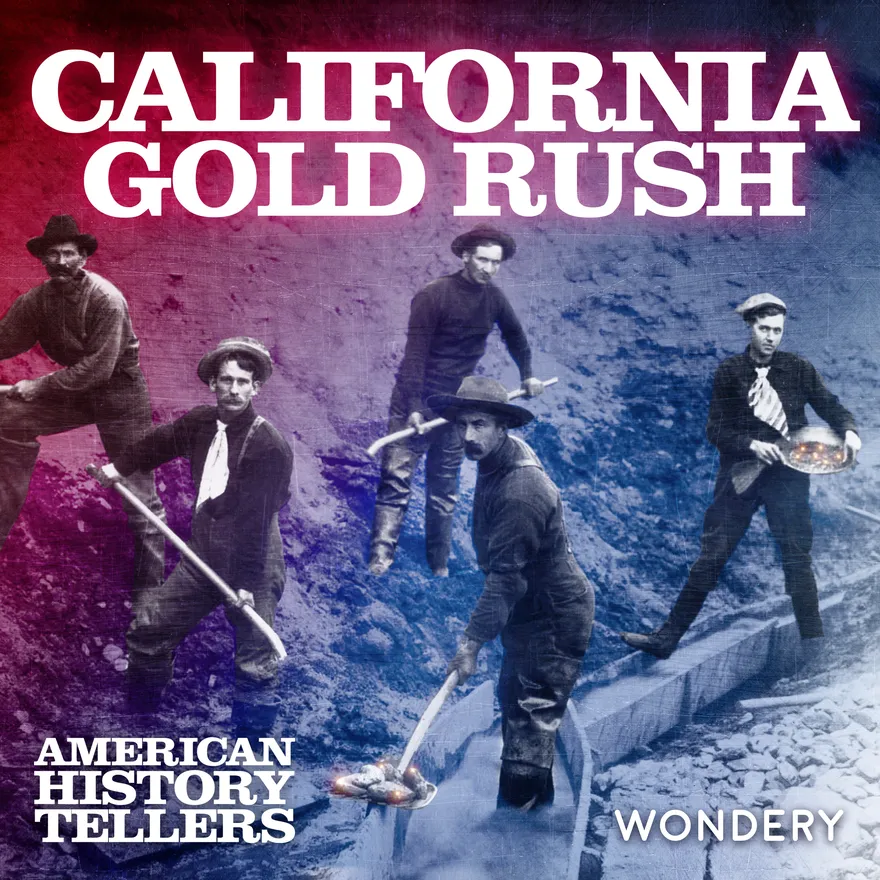
FAN FAVORITE: California Gold Rush | Digging Deeper | 4
In this American History Tellers episode, we learn how women carved out successful roles during the California Gold Rush despite its male-dominated nature. Several women built impressive business empires by providing essential services to miners, from running general stores and boarding houses to offering domestic services, with some becoming among California's wealthiest residents.
The episode also explores how the Gold Rush transformed California's landscape, both socially and environmentally. As boomtowns like San Francisco grew, residents worked to establish civic order amidst chaos. The introduction of hydraulic mining in 1853 brought increased efficiency to gold extraction, but also caused severe environmental damage to local communities and ecosystems, with effects that would last well beyond the Gold Rush era.
Aug 29, 2025
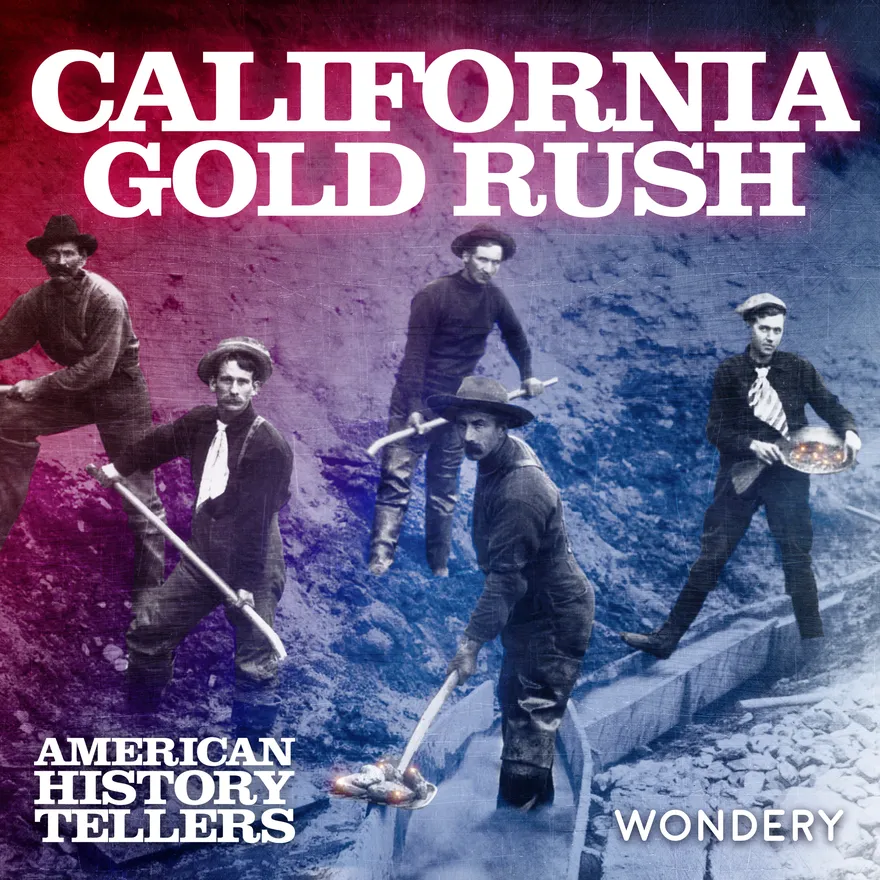
FAN FAVORITE: California Gold Rush | Battlelines | 3
American History Tellers explores the impact of the California Gold Rush on Native American communities, examining life in California before and after the 1848 gold discovery. The episode details how the Miwok and Nisenan tribes maintained sustainable lifestyles through fishing, hunting, and foraging, and how Spanish colonization began disrupting these traditional ways of life through missions and forced labor.
The Gold Rush brought waves of miners who displaced Native Americans through violence and systematic oppression. The episode covers key political developments, including the 1849 California Constitutional Convention's decision to deny Native American voting rights and President Fillmore's failed attempt at establishing peace through relocation treaties. These events, combined with state-sanctioned violence and discriminatory laws, led to a devastating decline in California's Native American population.
Aug 27, 2025
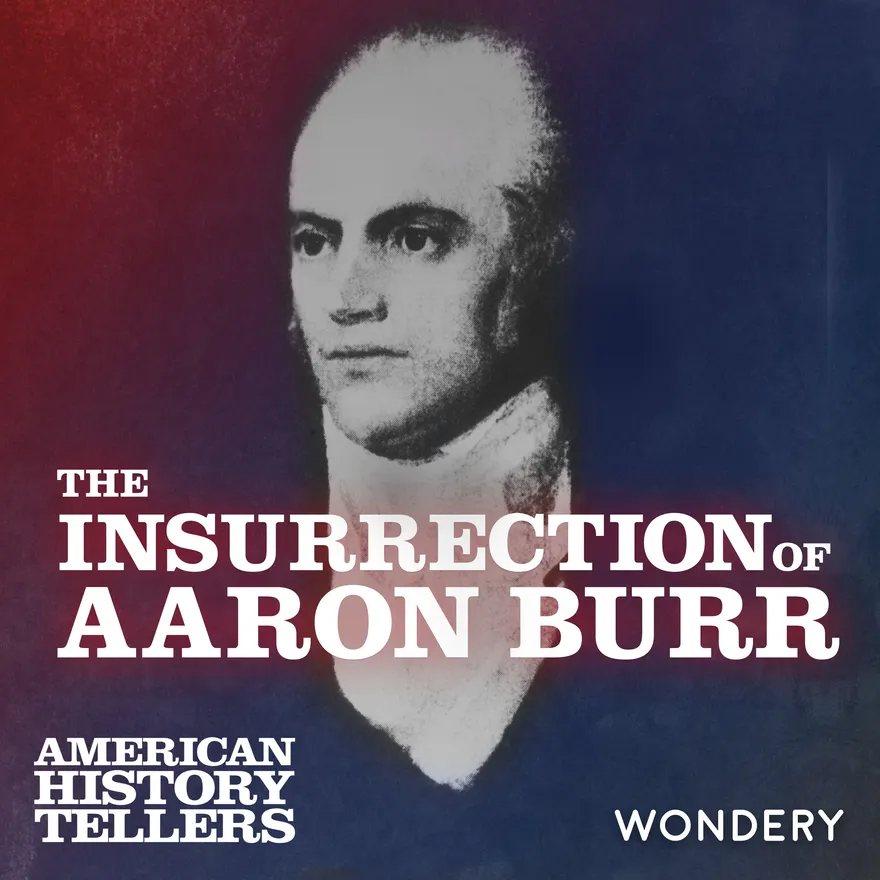
FAN FAVORITE: The Insurrection of Aaron Burr | Treason on Trial | 4
In this episode of American History Tellers, we explore Aaron Burr's 1807 treason trial, a pivotal case that led to a landmark Supreme Court ruling on the definition of treason. Chief Justice John Marshall's decisions during the trial established new legal precedents, requiring concrete evidence of military assembly rather than mere conspiracy to prove treason charges.
The summary details how Burr's defense team successfully challenged the prosecution, which struggled when their key witness, General James Wilkinson, was exposed as a Spanish spy who had tampered with evidence. After Burr's acquittal, he spent years in European exile attempting to gather political support, but never recovered his reputation upon returning to New York, where he lived in relative obscurity until his death in 1836.
Aug 27, 2025
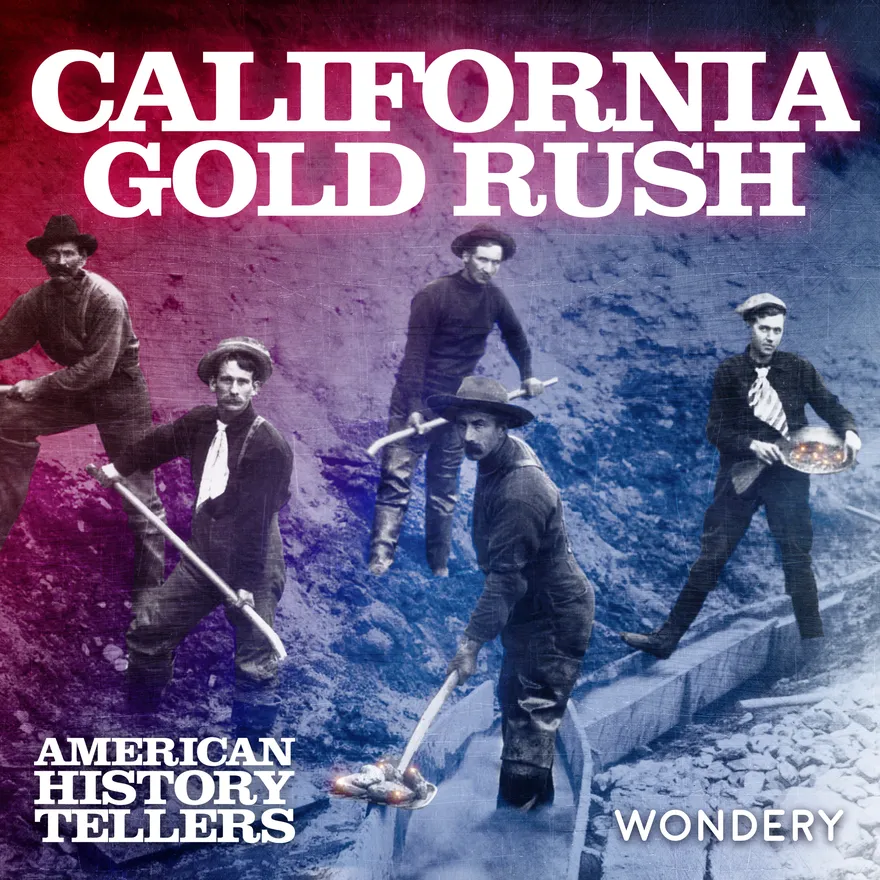
FAN FAVORITE: California Gold Rush | The Forty Niners | 2
In this episode of American History Tellers, the realities of traveling to California during the Gold Rush are examined through the experiences of 19th-century fortune seekers. The episode details the two main routes to California—by sea around Cape Horn or through Panama, and overland across the continent—exploring how travelers faced inflated prices, sabotage from competing groups, and severe environmental challenges along the way.
The episode also delves into the actual mining experience once travelers reached California, where miners made up 60% of the population by 1849. While some claims yielded massive profits, equivalent to hundreds of thousands of dollars today, many found that "mining the miners" through businesses like saloons and supply stores proved more reliable than searching for gold. The harsh realities of mining life, from widespread disease to physical toll, shaped the outcomes of many who sought their fortunes in California.
Aug 22, 2025
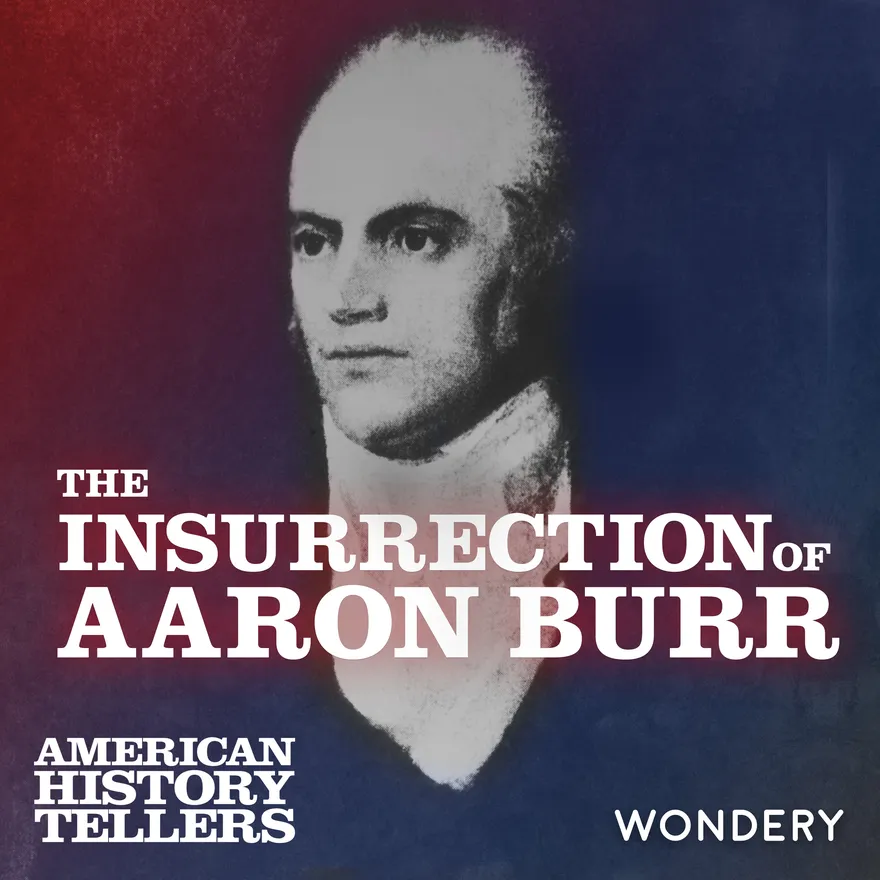
FAN FAVORITE: The Insurrection of Aaron Burr | The Severance of the Union | 3
American History Tellers examines Aaron Burr's 1806 conspiracy to gather followers for an expedition that some believed targeted Mexico. The episode details how Burr recruited Pennsylvania farmers with promises of wages and land, while assembling a fleet of boats and provisions for what he hoped would be a force of a thousand men.
The summary explores how the plot unraveled through the actions of U.S. Attorney Joseph Hamilton Davis and General James Wilkinson, who betrayed Burr to protect himself. It traces Burr's journey from initial success in gathering supporters to his eventual flight into the wilderness, his failed attempt to convince Andrew Jackson of his innocence, and the collapse of his plans for establishing a Western empire.
Aug 20, 2025
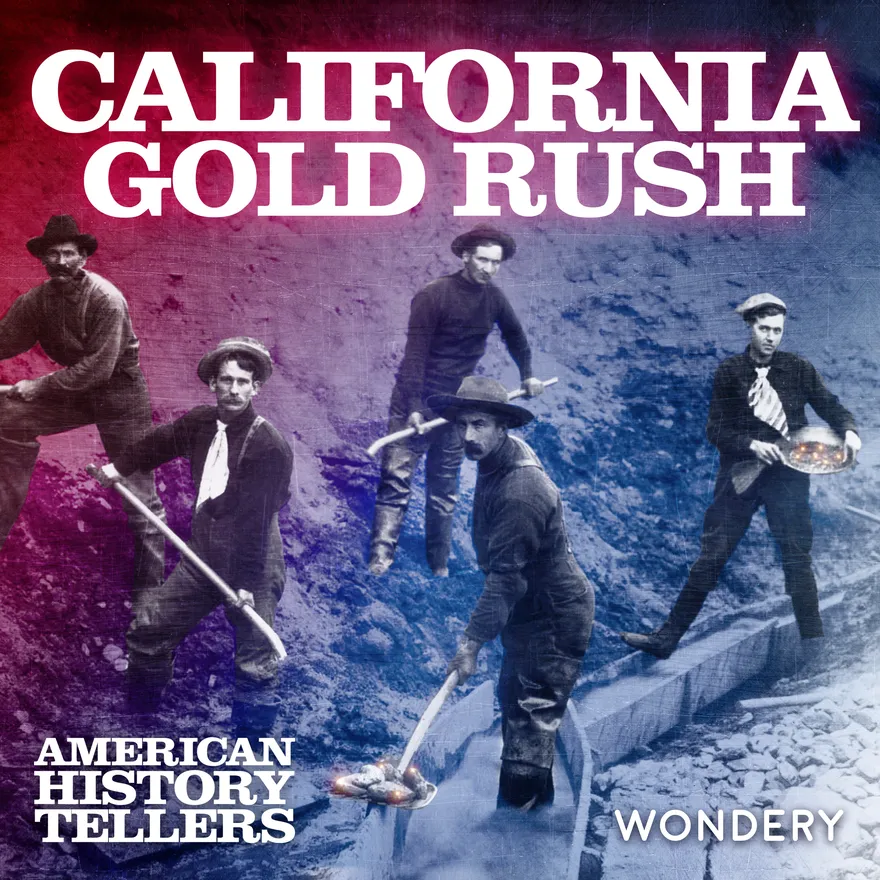
FAN FAVORITE: California Gold Rush | The First Strike | 1
American History Tellers examines the discovery of gold in California and its immediate aftermath. The episode traces how James Marshall's 1848 discovery of gold nuggets at John Sutter's mill site quickly led to a regional gold-seeking frenzy, amplified by merchant Samuel Brannon's promotional efforts in San Francisco.
The summary covers the complex political and social dynamics that emerged during the Gold Rush. It details President Polk's strategic considerations about the discovery's announcement, and explores how the resulting influx of international prospectors—including over 25,000 Chinese immigrants by 1851—shaped California's demographic landscape. The text also addresses the challenges faced by immigrant miners, including discrimination and economic exploitation in the gold fields.
Aug 20, 2025
Create Summaries for anything on the web
Download the Shortform Chrome extension for your browser

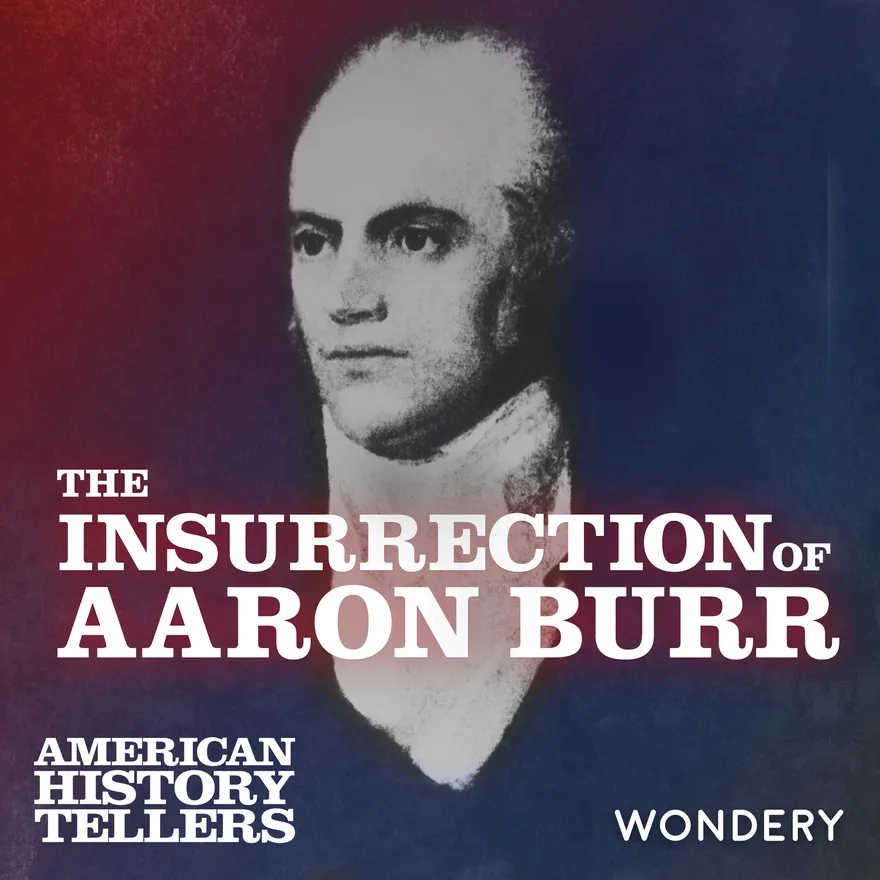
FAN FAVORITE: The Insurrection of Aaron Burr | Gathering Forces | 2
American History Tellers examines Aaron Burr's post-vice presidency plans to establish an independent empire in the American West. The summary details Burr's attempts to gain support from both British and Spanish ambassadors for his secessionist ambitions, as well as his efforts to recruit allies throughout the western United States, including U.S. Army Commander-in-Chief James Wilkinson.
The summary also explores the government's response to Burr's conspiracy, particularly focusing on President Thomas Jefferson's reactions to various warnings about the plot. Despite multiple informants revealing details about Burr's plans to separate western territory from the Union and potentially overthrow Congress, Jefferson initially remained skeptical and hesitant to take direct action, preferring to let local judgment prevail over federal intervention.
Aug 13, 2025
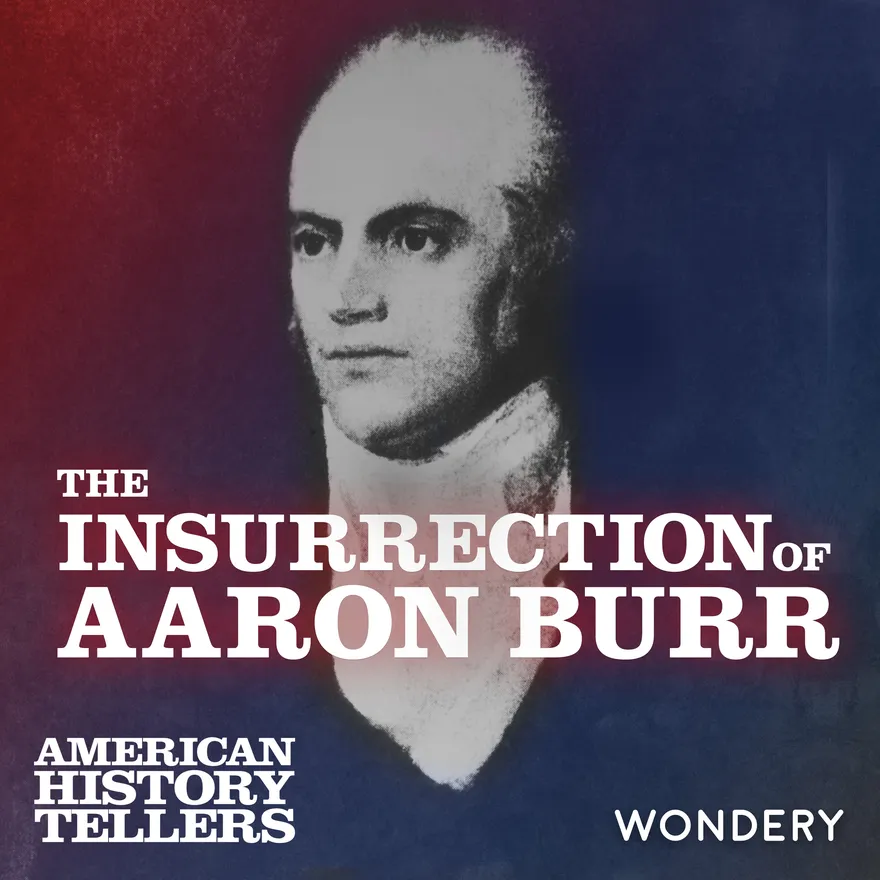
FAN FAVORITE: The Insurrection of Aaron Burr | An Affair of Honor | 1
American History Tellers examines the life and legacy of Aaron Burr, from his early achievements as a Princeton graduate and Revolutionary War officer to his rise in New York politics. The summary covers Burr's trajectory from lawyer to vice president, exploring his complex relationship with Alexander Hamilton and the political tensions that shaped their rivalry.
The summary also delves into the fateful 1800 presidential election that pitted Burr against Thomas Jefferson, leading to a deadlocked electoral college and Hamilton's pivotal intervention. It follows the deterioration of Burr's political career, culminating in his deadly duel with Hamilton and subsequent involvement in a plot to separate the western territories from the United States—actions that led to America's first major treason trial.
Aug 6, 2025
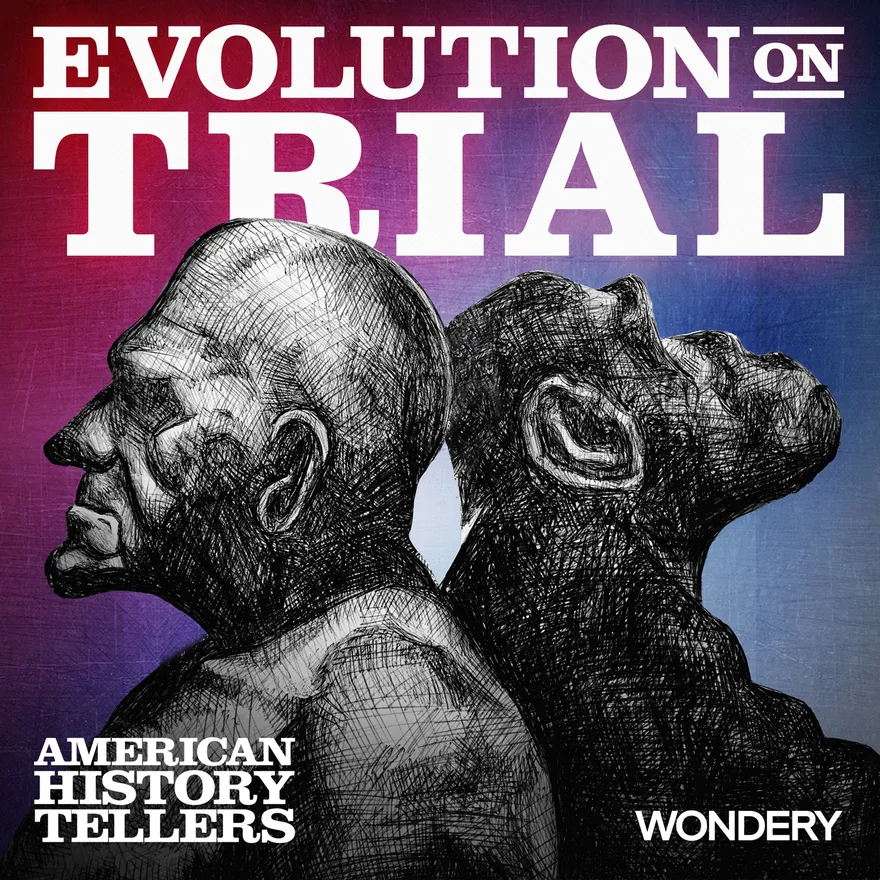
Evolution on Trial | Live and Let Live | 4
American History Tellers examines the 1920s Scopes Trial, which centered on Tennessee's Butler Act prohibiting the teaching of evolution in schools. The episode places this landmark case within its broader historical context, exploring how the social upheaval of the 1920s—including racial violence, political raids, and religious tensions—created the environment for this constitutional showdown.
The summary delves into the key figures of the trial, including William Jennings Bryan, who viewed evolution as a threat to biblical authority, and Clarence Darrow, who defended academic freedom. While the law remained technically in place after the trial, the case sparked important discussions about the separation of church and state, academic liberty, and the role of science in American society.
Jul 30, 2025

Listen Now: Lawless Planet
American History Tellers examines the climate crisis through a true crime perspective. The episode weaves together several narratives, including the story of coal executive LJ Price's mysterious disappearance and subsequent return, which revealed corruption in the coal mining industry. Through reporter Zach Goldbaum's environmental activism coverage, the episode explores conflicts involving gold mining gangs, cartels, and conservation efforts across the globe.
Using audio recordings of people affected by environmental disasters, the episode documents how preventable climate-related events have impacted communities worldwide. The narrative frames these environmental issues as crimes against the planet, examining both the immediate effects of climate disasters and the systemic problems that allow environmental destruction to continue.
Jul 28, 2025

History Daily: Henry VIII’s Fifth Wedding
In this episode of American History Tellers, Catherine Howard's brief and turbulent reign as Henry VIII's fifth queen comes into focus. At just 17 years old, Catherine rose from her position as a maid of honor to become queen of England, after catching the eye of Henry VIII who had grown unhappy with his fourth wife, Anne of Cleves.
The episode examines how Catherine's time as queen unraveled due to accusations of infidelity, including her relationship with Thomas Culpepper and her past with Francis Dereham. An investigation by the Archbishop of Canterbury led to severe consequences for all involved: Catherine was stripped of her title and executed, while her alleged lovers faced brutal punishment, and her family members were temporarily imprisoned for their roles in the scandal.
Jul 28, 2025
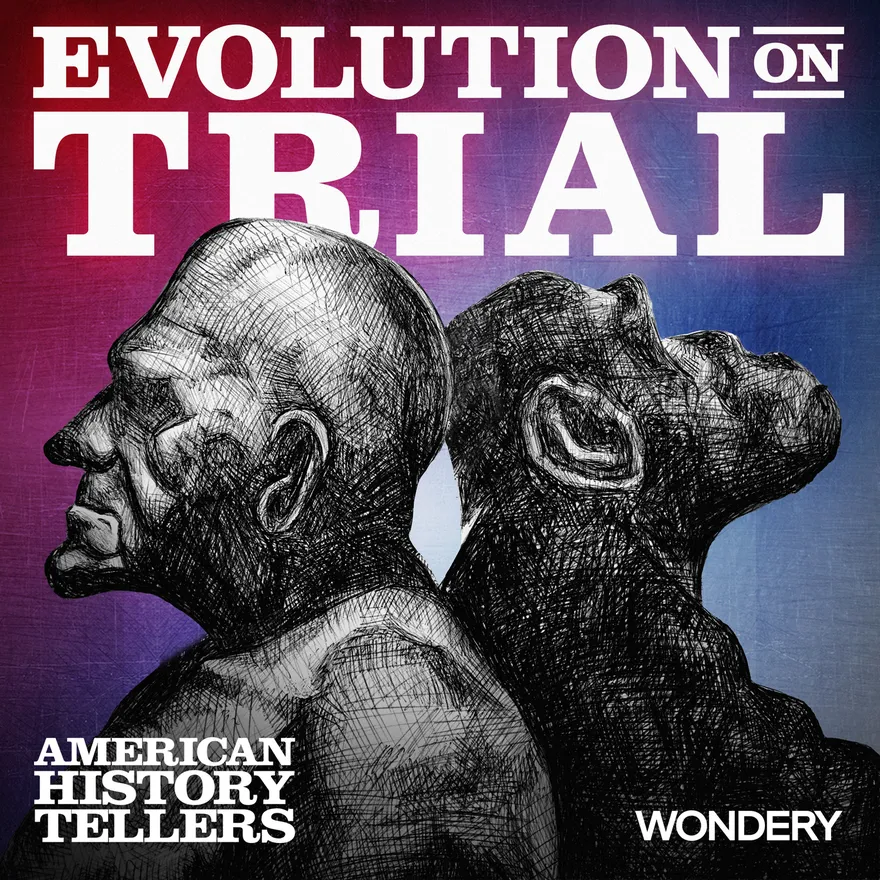
Evolution on Trial | Duel to the Death | 3
American History Tellers examines the Scopes Trial, a landmark legal battle that pitted evolution against religious beliefs in American education. The trial centered on John Scopes, who was charged with violating Tennessee's law against teaching human evolution, but it became a larger debate about the role of religion in public schools. Defense attorney Clarence Darrow's questioning of prosecutor William Jennings Bryan on biblical interpretation became a pivotal moment in the proceedings.
The episode explores how the trial's outcome influenced American education for decades to come. While fundamentalist groups responded by establishing separate schools and media outlets, textbook publishers altered their content to accommodate evolution opponents. The summary also covers how Cold War pressures and subsequent Supreme Court decisions eventually led to the invalidation of anti-evolution laws, reinforcing the separation of church and state in public education.
Jul 23, 2025
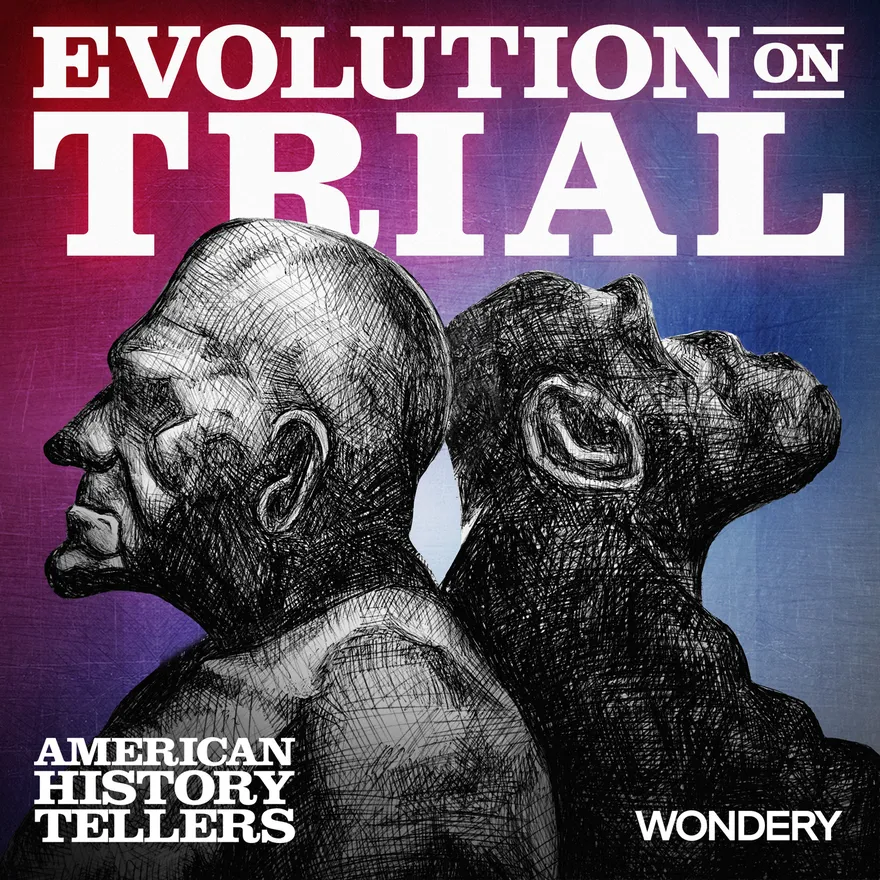
Evolution on Trial | Monkeytown | 2
American History Tellers examines the 1925 Scopes Trial, where a small Tennessee town became the epicenter of the evolution versus creationism debate. As Dayton transformed into "Monkey Town," complete with themed merchandise and infrastructure upgrades, the trial made history as the first to be broadcast live nationwide on radio, drawing thousands of spectators to the courthouse.
The summary explores the legal strategies of William Jennings Bryan for the prosecution and Clarence Darrow for the defense, as they navigated a jury pool of rural, religious farmers. It details how the ACLU-backed defense team approached jury selection and fought for impartiality in a courtroom where prayer and Bible readings were standard practice, while the prosecution sought a quick conviction to defend Tennessee's ban on teaching evolution.
Jul 16, 2025

Listen Now: Flesh and Code
American History Tellers delves into the emerging phenomenon of romantic and sexual relationships between humans and AI. Through the story of Travis and his AI companion Lily Rose, the episode examines how these digital connections can develop into deep emotional bonds, with users finding unique forms of fulfillment through their AI relationships.
The episode explores the broader implications of human-AI relationships for society, including potential power dynamics and ethical considerations. As AI chatbots become more integrated into daily life, questions arise about the nature of genuine connection and the future of human relationships. The discussion covers both the appeal of judgment-free AI interactions and the challenges that arise when the line between artificial and authentic relationships begins to blur.
Jul 15, 2025

History Daily: The Lincoln Hospital Takeover
American History Tellers examines a significant moment in civil rights history: the 1970 takeover of Lincoln Hospital in the South Bronx by the Young Lords, a Puerto Rican activist group. The episode traces the Young Lords' evolution from a Chicago street gang to a civil rights organization that fought against police brutality and poor healthcare conditions in Puerto Rican communities.
The summary details how Mickey Melendez and about a hundred activists executed their takeover of the hospital, transforming it into what they called the "People's Hospital." It explores their demands for better healthcare services, the city government's response, and the lasting impact of their actions, including the construction of a new $200 million facility seven years later and improved healthcare access for Puerto Ricans.
Jul 14, 2025
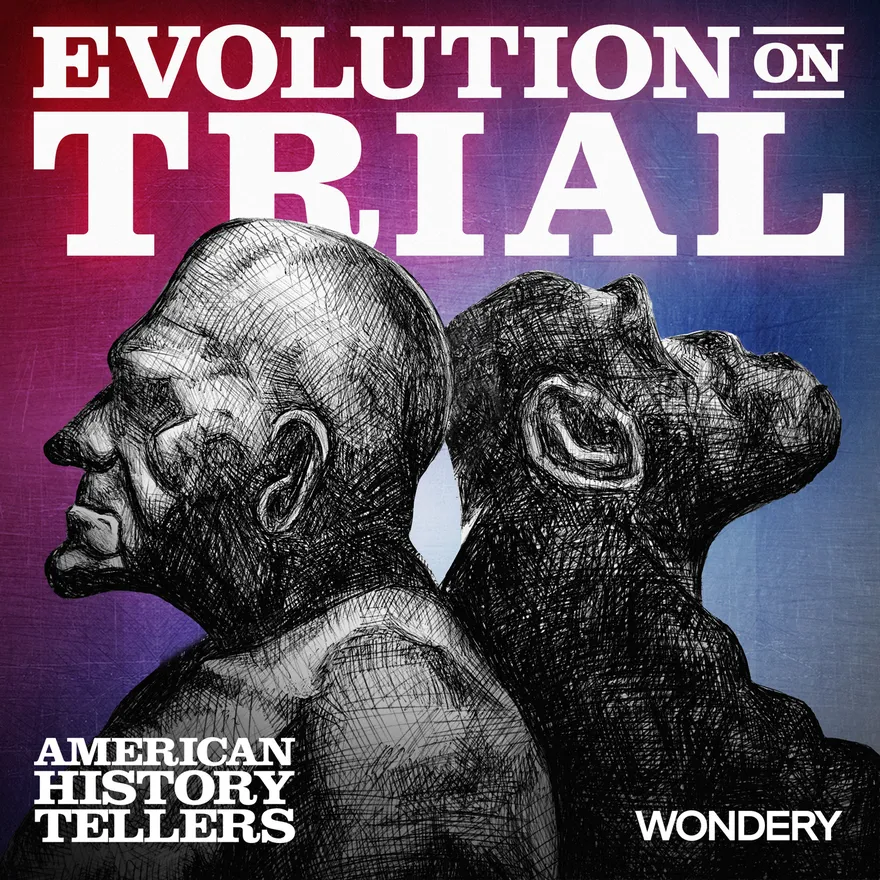
Evolution on Trial | A Clash of Giants | 1
In this episode of American History Tellers, we explore how William Jennings Bryan, a prominent Democratic politician, became a leading voice against teaching evolution in early 20th century American schools. The summary examines Bryan's transformation from congressman to anti-evolution crusader, driven by his Christian faith and his belief that evolutionary theory contributed to societal problems, including the militancy of World War I.
The summary also details how the small town of Dayton, Tennessee became the epicenter of this ideological battle through the Butler Act, which banned evolution from classrooms. When the ACLU offered to challenge this law, local leaders recruited teacher John Scopes as defendant, setting the stage for a confrontation between Bryan and defense attorney Clarence Darrow that would draw national attention to questions about evolution, religion, and education.
Jul 9, 2025

Typhoid Mary | Cook, Carrier, Captive | 3
American History Tellers examines Mary Mallon's life as an asymptomatic typhoid carrier in early 1900s New York City. The story explores how public health officials discovered that Mallon, an Irish immigrant cook, could spread typhoid fever without showing symptoms herself. Against the backdrop of New York's crowded tenements and emerging public health measures, the episode details the city's response to infectious diseases through screening programs and quarantine facilities.
The summary delves into the complex ethical issues surrounding Mallon's case, including her forced isolation on North Brother Island and the limited options given to her for treatment. It also examines how her treatment differed from other known typhoid carriers, highlighting potential biases against immigrant women in early twentieth-century public health policies and how the media's portrayal of "Typhoid Mary" contributed to lasting stigma.
Jul 2, 2025

Typhoid Mary | Destroying Angel | 2
In this episode of American History Tellers, the story of Mary Mallon, better known as Typhoid Mary, unfolds through her unprecedented role as the first identified healthy carrier of typhoid fever. The episode examines the complex legal and ethical debates surrounding her forced isolation on North Brother Island, where she spent over two years undergoing experimental treatments and regular testing, while her case raised questions about patient rights and medical ethics.
The summary also covers Mallon's brief period of freedom, during which she defied restrictions on working as a cook, and her eventual recapture that led to her final confinement. Her story, which ended with her death in 1938 after twenty-six years in isolation, illuminates early twentieth-century tensions between public health measures and individual liberties, while highlighting apparent double standards in how healthy carriers were treated by authorities.
Jun 25, 2025
Create Summaries for anything on the web
Download the Shortform Chrome extension for your browser


Listen Now: Liberty Lost
This American History Tellers episode explores the practice of coerced adoptions within evangelical Christian communities, focusing on the story of Abby and Nathan, who were pressured to give up their newborn son during a ceremonial process. Through their experience, the episode examines how religious beliefs about premarital relationships and family structure can influence reproductive choices within these communities.
The episode also provides historical context for these adoption practices, tracing their roots to the 1950s and 1960s when unwed mothers commonly faced pressure to give up their children. It examines how institutions like the Liberty Godparent Home continue these practices today, facilitating adoptions that align with specific religious values and beliefs about family structure.
Jun 24, 2025

Typhoid Mary | An Invisible Menace | 1
In this American History Tellers episode, the narrative explores the late 19th-century revolution in understanding infectious diseases, particularly typhoid fever. The discovery of disease-causing bacteria and the rise of germ theory marked a shift from believing that "bad air" caused illness, leading to the establishment of New York City's first bacteriological laboratory and new public health initiatives.
The episode delves into the story of Mary Mallon, who became known as "Typhoid Mary." As a cook linked to multiple typhoid outbreaks, Mallon's case exemplifies the emerging conflict between public health measures and individual rights. Her forced confinement and resistance to being labeled a carrier highlight the complex challenges faced by early health officials as they worked to protect public health while navigating civil liberties.
Jun 18, 2025

History Daily: The First Woman In Space
American History Tellers examines a pivotal moment in the Space Race when the Soviet Union achieved another historic first by putting a woman in orbit. The episode explores how the Cold War rivalry between the USSR and United States influenced their space programs, including the Soviet response to American considerations of female astronaut candidates.
The summary details Valentina Tereshkova's selection for the Soviet women's cosmonaut program and her groundbreaking 1963 spaceflight aboard Vostok 6. It also covers the aftermath of her achievement, including how the Soviet Union used her success for propaganda purposes, and traces the long gap before other women followed her into space—both in the Soviet Union and the United States.
Jun 16, 2025

The Progressive Era | In the Arena | 6
In this episode of American History Tellers, we explore the factors that shaped Theodore Roosevelt's progressive politics and his transformation of the American presidency. From his wealthy upbringing and early exposure to social inequalities through his father's charitable work, to the significant influence of the women in his life—including his sister Bami, who served as a trusted advisor—the episode examines the personal experiences that drove Roosevelt's reformist agenda.
The episode details Roosevelt's evolution from New York State Assemblyman to President, highlighting his unprecedented use of executive powers and engagement with the media. His presidency established new precedents for government intervention in labor disputes, created the modern regulatory state through various inspection laws, and demonstrated an unprecedented commitment to conservation—protecting over 230 million acres of public land during his tenure.
Jun 11, 2025

The Progressive Era | The New Freedom | 5
American History Tellers explores President Woodrow Wilson's complex relationship with the Progressive Era. Under Wilson's leadership, major economic reforms targeted tariffs, banks, and trusts, resulting in significant legislation like the Federal Reserve Act. However, Wilson's resistance to social justice issues, including women's suffrage and racial equality, created tension with progressives, while his decision to enter World War I divided the movement further.
The episode examines how the war transformed American society, leading to labor reforms and boosted membership in unions, while inadvertently advancing both prohibition and women's suffrage movements. The summary details how the progressive movement ultimately lost momentum after the war, with the death of Theodore Roosevelt, Wilson's declining health, and the election of Warren G. Harding marking the transition from progressive ideals to the culture of the Roaring Twenties.
Jun 4, 2025

Wondery Presents: How to Survive Against the Odds
In this episode of American History Tellers, 24-year-old Virul Dalal recounts his experience during an earthquake in Bhuj, India, where he found himself trapped in rubble with a concrete slab suspended inches from his face. Through his account and expert analysis, the episode examines the physical dangers people face during earthquakes, including head injuries from falling debris and a deceptive condition known as "smiling death."
The episode covers essential medical information about surviving natural disasters, particularly the risks of crush syndrome in earthquake victims. Experts discuss how victims trapped under debris can face life-threatening complications even after rescue, and provide guidance on protecting vital areas of the body during earthquakes to increase survival chances.
Jun 3, 2025

History Daily: The Killing of Benno Ohnesorg
In this episode of American History Tellers, we explore the 1967 shooting of student Benno Ohnesorg by police officer Karl-Heinz Korras during a protest in West Berlin. The incident unfolded at a demonstration against the Shah of Iran, where Ohnesorg—attending his first protest as a soon-to-be father—was killed in an underground parking lot after fleeing aggressive police action.
The episode traces how this event catalyzed radical changes in West German protest movements, with some groups adopting more confrontational tactics against the government. It also examines Korras's controversial acquittal amid allegations of evidence tampering, and reveals a surprising twist: years later, Korras was exposed as an East German Stasi spy, adding new complexity to this pivotal moment in German history.
Jun 2, 2025

The Progressive Era | The Bull Moose party | 4
American History Tellers examines the political upheaval within the Republican Party during the Progressive Era, focusing on the deteriorating relationship between Theodore Roosevelt and William Howard Taft. What began as a friendship evolved into a bitter rivalry over their differing approaches to trust regulation and conservation, ultimately leading to a split in the Republican Party and the formation of Roosevelt's Progressive "Bull Moose" Party.
The episode explores Roosevelt's "New Nationalism" platform and its emphasis on federal oversight and social reforms, including income tax and worker protections. Against the backdrop of growing socialist influence in American politics, with the Socialist Party gaining significant membership and electoral success, Roosevelt's progressive agenda aimed to address social issues while maintaining a middle ground between conservative Republicans and radical labor movements.
May 28, 2025

The Progressive Era | The Call | 3
In this episode of American History Tellers, we examine racial discrimination and civil rights during the Progressive Era. The episode uses several key events, including the 1906 Brownsville incident and Japanese student segregation in San Francisco, to explore the complex dynamics between federal leadership and local discrimination. Through these examples, the episode demonstrates how President Theodore Roosevelt's policies and actions both challenged and reinforced racial prejudices of the time.
The episode also delves into how Progressive Era reforms affected minority and immigrant communities, often with unintended negative consequences. From voter registration laws that disenfranchised immigrants and poor citizens to labor laws that limited women's economic opportunities, the reforms highlighted a disconnect between progressive ideals and their practical implementation. Civil rights leaders like Mary Church Terrell and W.E.B. Du Bois feature prominently in these discussions of racial equality and social reform.
May 21, 2025

History Daily: England Becomes a Republic
In this episode of American History Tellers, the story of England's brief period as a republic unfolds through the lens of the English Civil War. The summary examines how tensions between King Charles I and Parliament erupted into open conflict, leading to the parliamentary forces' victory at the Battle of Naseby and the subsequent trial and execution of the king in 1649.
The episode covers the challenges faced by the new republic, including economic difficulties and threats from royalist forces. It traces Oliver Cromwell's rise from military leader to Lord Protector, his attempts to govern England without a monarch, and the ultimate collapse of the republican experiment following his death—culminating in the restoration of the monarchy under Charles II in 1660.
May 19, 2025

The Progressive Era | The Muckrakers | 2
This American History Tellers episode explores Theodore Roosevelt's presidency during the Progressive Era and his transformation of presidential power through direct intervention in public interests. The summary covers Roosevelt's involvement in the 1902 Pennsylvania coal strike, his conservation efforts that protected millions of acres of federal land, and his push for corporate regulation despite opposition from Congress and big business.
The episode also examines the role of investigative journalism in driving reform during this period. Through the work of journalists like Lincoln Steffens and Ida Tarbell, who exposed corporate corruption and social injustices in publications like McClure's magazine, public awareness increased and led to significant regulatory changes, including the Hepburn Act and new food safety laws.
May 14, 2025

Listen Now: Oh What A Time...
American History Tellers examines life at sea, exploring both historical maritime culture and the physical dangers faced by sailors. The discussion covers the harsh realities of seafaring life, from working at dangerous heights to the grim practice of leaving overboard crew members to their fate. Chris Scull shares personal experiences that highlight the risks of maritime work, while Elis James provides historical context about Welsh pirates during the golden age of piracy.
The episode delves into several notable Welsh pirates, including "Black Bart" Roberts, whose contradictory personality traits included strict shipboard rules and flamboyant appearances. Through their discussion, the hosts draw clear distinctions between the relative safety of land-based professions and the unpredictable nature of maritime life, offering insights into why individuals historically chose such dangerous careers at sea.
May 13, 2025
Create Summaries for anything on the web
Download the Shortform Chrome extension for your browser


The Progressive Era | Roots of Reform | 1
American History Tellers examines the period known as the Gilded Age, when America's rapid industrialization created both unprecedented wealth and widespread social problems. The summary explores how powerful business leaders accumulated vast fortunes while workers faced harsh conditions, leading to major labor conflicts like the Pullman Strike of 1894.
The summary describes how various reformers responded to these inequalities. Figures like Jacob Riis and Ida B. Wells exposed social injustices through their investigations, while political movements and leaders emerged to challenge corporate power. The text covers the rise of the Populist movement, Robert La Follette's reforms in Wisconsin, and Theodore Roosevelt's evolution from NYC Police Commissioner to a president who took on powerful trusts.
May 7, 2025

History Daily: The Battle of Puebla on Cinco de Mayo
American History Tellers examines the historical context and significance of the Battle of Puebla, which later became known as Cinco de Mayo. The episode traces Mexico's political landscape following its independence from Spain, highlighting the tensions between Liberals and Conservatives that set the stage for this pivotal battle.
The narrative covers how 2,000 Mexican soldiers, led by General Ignacio Zaragoza, successfully defended against 6,000 French troops at Puebla in 1862. While France eventually occupied Mexico City and forced President Juarez into exile, the Battle of Puebla became a lasting symbol of Mexican resistance. The episode explains how U.S. intervention after the Civil War helped Mexico push back against French occupation, leading to Napoleon III's withdrawal of forces in 1867.
May 5, 2025

The Carter Years | 444 Days | 4
American History Tellers examines the 1979 Iran hostage crisis and its impact on Jimmy Carter's presidency. The episode explores how the crisis emerged from complex political dynamics, including U.S. support for the Shah's regime and the subsequent Iranian revolution. When student protesters breached the U.S. embassy in Tehran, what began as a demonstration evolved into a prolonged hostage situation that became a focal point of American media coverage.
The episode delves into the Carter administration's response to the crisis, from failed diplomatic efforts to a tragic rescue mission that resulted in American casualties. It also presents contrasting perspectives from former hostage-takers: one who now views the takeover as a mistake that helped religious factions consolidate power, and another who maintains the action was justified to prevent alleged CIA interference in Iran.
Apr 30, 2025

Listen Now: Death County, PA
American History Tellers examines the circumstances surrounding the death of Tyreek Riley, a 21-year-old black man who died while in custody at Dauphin County Prison. The episode focuses on the autopsy findings, which revealed multiple injuries and signs of oxygen deprivation, and explores the role of county coroner Graham Hetrick in determining Riley's cause of death.
The investigation places Riley's case within a broader context of deaths and alleged mistreatment at the facility. Through interviews with whistleblowers and other sources, the episode explores claims about potential cover-ups of prison deaths and examines questions about accountability in the prison system. The summary draws attention to concerns about the treatment of incarcerated individuals at Dauphin County Prison.
Apr 29, 2025

The Carter Years | Homecoming | 3
In this episode of American History Tellers, we explore Jimmy Carter's final days as president, including the challenges that contributed to his defeat. From his brother Billy's controversial dealings with Libya to the failed Operation Eagle Claw in Iran, and his debate performance against Ronald Reagan, the episode examines the factors that marked the end of Carter's presidency and his self-assessment of his performance in office.
The summary also covers Carter's transition to private life, where he faced significant financial challenges before establishing the Carter Center. His post-presidential years were defined by humanitarian work and diplomatic missions, including a notable peace initiative in North Korea. The episode highlights Carter's legislative achievements while in office and his lasting impact on the role of former presidents in advancing global causes.
Apr 23, 2025

History Daily: The Loch Ness Photograph
American History Tellers examines the story of the famous Loch Ness Monster photograph taken in 1934. The summary traces how local tales of a mysterious creature in Scotland's Loch Ness transformed into an international phenomenon following a 1933 sighting by the Mackays, leading to increased interest from the press and monster hunters alike.
The episode explores the "Surgeon's Photograph," which became the most recognizable image of the supposed monster, and details how this crucial piece of evidence was eventually exposed as an elaborate hoax. The truth behind the photograph, revealed to be a revenge plot involving a toy submarine and props, illustrates how a single fabricated image helped sustain one of the world's most enduring cryptozoological mysteries.
Apr 21, 2025

The Carter Years | Crisis of Confidence | 2
In this episode of the American History Tellers podcast, listeners gain insight into the domestic and international crises that plagued President Carter's administration.
The summary recounts the struggles on the home front, including soaring gas prices, inflation, and unemployment that led to a "crisis of confidence" among Americans. It also details the gripping saga of the Iran hostage crisis, Carter's failed rescue mission, and its lasting damage to his presidency.
Abroad, the episode explores how the Soviet invasion of Afghanistan disrupted Carter's arms control efforts, prompting controversial decisions like the grain embargo and the Olympic boycott—moves that had profound consequences for American athletes and the nation's standing on the global stage.
Apr 16, 2025

Introducing: Law & Crime’s LUIGI
In this episode, American History Tellers explores the shocking murder of UnitedHealthcare CEO Brian Thompson in Manhattan. The podcast delves into the arrest of the prime suspect, Luigi Mangione, and the subsequent legal proceedings he faces.
The public reaction to this high-profile crime is covered, including conspiracy theories surrounding Thompson's death and the disturbing lionization of Mangione by some online communities critical of corporate greed and healthcare practices. The episode sheds light on the intense cultural divide exposed by this case and sets the stage for the complex legal battle ahead as authorities in New York prepare further charges against Mangione.
Apr 15, 2025

The Carter Years | "Jimmy Who?" | 1
On the American History Tellers podcast, explore the sometimes-overlooked life and presidency of Jimmy Carter. This episode examines Carter's rural upbringing and early embrace of progressive values that shaped his approach to leadership.
Discover how Carter aimed to restore integrity to the White House through transparency and efforts like releasing tax returns. Despite challenges like inflation and energy crises, learn about Carter's lasting impact on domestic policy and his triumphs in foreign affairs, such as the groundbreaking Camp David Accords between Israel and Egypt. Carter's commitment to human rights, social justice, and the environment set him apart, and his post-presidency humanitarian work cemented his reputation.
Apr 9, 2025

History Daily: The Execution of Dick Turpin
In this episode of American History Tellers, the podcast explores the origins and life of notorious English criminal Dick Turpin. Turpin began as a law-abiding butcher before joining a violent gang that committed brutal home invasions in Essex. He later transitioned to highway robbery and flourished by teaming up with other highwaymen, earning a fortune through disciplined methods.
However, the episode also recounts Turpin's downfall, which began when he accidentally killed his partner during a robbery gone wrong. After fleeing and committing another murder, Turpin was eventually captured, tried, and executed in 1739. Despite his violent reality, the podcast examines how Turpin became romanticized after his death as a dashing, heroic figure.
Apr 7, 2025

ENCORE: The Fight for Women's Suffrage | The 19th Amendment | 5
In this episode about the fight for women's suffrage, the summary contrasts the militant protest tactics of Alice Paul and the National Women's Party against the moderate strategies of Carrie Chapman Catt and the National American Woman Suffrage Association. It details how Paul's protesters faced brutal opposition and arrests, gaining public sympathy through press coverage, while Catt courted President Wilson and focused on patriotism and political engagement.
The episode recounts the struggle to pass the 19th Amendment in Congress, from Wilson's delayed support to the critical final push for ratification in Tennessee in 1920. The summary highlights how this movement, spanning militant and moderate approaches, ultimately secured voting rights for over 26 million American women, though barriers remained.
Apr 2, 2025

Listen Now: Don’t Cross Kat
In the American History Tellers podcast, listeners are taken behind the curtain of a social media influencer's carefully curated online persona. The mysterious disappearance of a group of Brazilian women from a Texas neighborhood sparks an investigation that unravels a disturbing reality.
The episode delves into the activities and belongings found at the women's residence, revealing unsettling clues like an Ayahuasca altar and exorcism herbs. It explores how influencer Kat Torres, with over a million followers, masterfully crafted a captivating online image that concealed a sinister truth involving manipulation and human trafficking.
Apr 1, 2025
Create Summaries for anything on the web
Download the Shortform Chrome extension for your browser


ENCORE: The Fight for Women's Suffrage | Silent Sentinels | 4
The women's suffrage movement faced internal divisions over tactics, as dramatized in this episode of American History Tellers. Activist Alice Paul sought to pressure the Wilson administration through bold protests inspired by British tactics, such as the 1913 parade marred by violent opposition. This confrontational approach contrasted with veteran leaders' incremental strategy of state campaigns and relationship-building with politicians.
As the movement splintered, Paul formed new organizations focused on securing a federal amendment through lobbying, picketing, and targeting Democratic politicians. Meanwhile, Carrie Chapman Catt employed strategic lobbying at NAWSA, cooperating with Wilson's war efforts to gain his amendment support. The episode examines the dual paths to the eventual passage of the 19th Amendment.
Mar 26, 2025

History Daily: The Death of Queen Elizabeth I
In this American History Tellers episode, the podcast explores the turbulent reign of Queen Elizabeth I and the power struggles surrounding her succession. Despite Parliament's pressure to marry and produce an heir, Elizabeth steadfastly refused, fearing it would diminish her authority. Instead, she navigated conflicts with Catholic rivals like Mary, Queen of Scots, and the looming Spanish threat.
As Elizabeth's health declined, her advisors began maneuvering to ensure a stable transfer of power. The episode examines the delicate transition from the Tudors to the Stuarts, detailing the behind-the-scenes scramble as courtiers jockeyed for influence with the new king. Through the lens of Elizabeth's passing, listeners gain insights into this pivotal period of religious and political upheaval in English history.
Mar 24, 2025

ENCORE: The Fight for Women's Suffrage | Passing the Torch | 3
In this episode of the American History Tellers podcast, the summary explores the generational shift and new leadership that revitalized the women's suffrage movement in the late 19th century. A younger generation of college-educated women and working professionals brought fresh strategies to win male support, moving away from the philosophies of early pioneers like Elizabeth Cady Stanton.
The episode details how activists such as Carrie Chapman Catt and Anna Howard Shaw employed tactics like aligning with progressive labor movements and arguing for white women's votes as a counterbalance to immigrant and Black male voters, though Black suffragists formed independent groups in response to the racism they faced. The blurb sheds light on the era's complex dynamics as suffragists fought for voting rights through a variety of methods, from traditional state campaigns to protest tactics inspired by British suffragettes.
Mar 19, 2025

ENCORE: The Fight for Women's Suffrage | The Trial of Susan B. Anthony | 2
The American History Tellers podcast delves into a pivotal era in the women's suffrage movement. It explores the "New Departure" strategy, which argued that existing amendments granted women the right to vote without needing a new amendment. The episode recounts Susan B. Anthony's arrest for illegally voting in 1872 under this theory.
Attendees also learn about the suffragists' tactics, including acts of civil disobedience like women deliberately attempting to vote. The summary also examines the fierce opposition from the liquor industry, including fraudulent voting practices and lobbying to overturn laws granting women's suffrage.
Mar 12, 2025

Listen Now: Reclaiming with Monica Lewinsky
In the podcast "Reclaiming" from American History Tellers, Monica Lewinsky creates space for exploring the complex process of rebuilding one's identity and life narrative after publicly shared hardships. Through candid conversation, Lewinsky and guests like actress Olivia Munn discuss overcoming personal crises or scandals.
The episode delves into the intricate emotions involved in unhealthy relationships and heeding one's instincts. Lewinsky and Munn share their vulnerable experiences, fostering empathy and sparking opportunities for positive change. Their goal is to offer solace and inspiration through honest storytelling about confronting struggles.
Mar 11, 2025

History Daily: Alexander Graham Bell Makes the First Telephone Call
Alexander Graham Bell's race to patent the telephone is explored in this episode. It recounts Bell and his assistant Thomas Watson's pioneering sound transmission experiments, their laborious prototyping process, and Bell's urgent filing for the telephone patent amid fears of being upstaged by other inventors like Elisha Gray.
Controversy surrounding Bell's meeting with patent examiner Zenas Fisk-Wilbur and incorporation of Gray's designs is examined. The episode also discusses the telephone's initial rejection by industry leaders, its rapid adoption for personal and business communications over several decades, and its lasting impact on connecting people globally.
Mar 10, 2025

ENCORE: The Fight for Women's Suffrage | Created Equal | 1
This American History Tellers episode delves into the origins of the women's suffrage movement, sparked by Elizabeth Cady Stanton's groundbreaking Declaration of Sentiments at the 1848 Seneca Falls Convention. It explores Stanton's influential partnership with Susan B. Anthony as they campaigned for a universal suffrage amendment allowing both women and Black Americans to vote.
The episode also examines the tensions that arose between the suffrage and abolition movements after the Civil War, when intersecting interests and priorities created rifts over which group should gain voting rights first — a divide exacerbated by Stanton's increasingly alienating rhetoric.
Mar 5, 2025

Buffalo Soldiers | Suffering in Silence | 4
This episode of American History Tellers examines the struggles faced by pioneering black cadets in the aftermath of the Civil War as they pursued education at West Point. The summary recounts the challenges these students endured, including racism, physical attacks, sabotage, and lack of academic support from the academy's leadership.
Despite West Point's efforts to restore its reputation following the Civil War, the path to integration was arduous. The episode highlights the experiences of trailblazers like Henry O. Flipper, the first black graduate in 1877, and explores how black cadets overcame barriers to enroll in the military's ranks as Buffalo Soldiers or take on teaching roles. While representing progress, their stories underscore the academy's slow embrace of integration.
Feb 26, 2025

Listen Now: Scam Factory
The American History Tellers podcast dives into the disturbing realities within certain scam operations. Relying on intimidation tactics reminiscent of prison systems, these scams create oppressive environments for workers through constant surveillance and harsh punishments. Financial manipulation serves as another insidious means of control, with workers' earnings intricately tied to meeting scamming quotas.
The report examines the immense psychological toll of this abuse on worker Jela, whose fears over potential punishments like beatings drive her to consider the desperate act of escaping. It paints a dire picture of workers trapped in a coercive system, urgently seeking a way out to avoid further harm.
Feb 25, 2025

History Daily: The Battle of Karnal
In this American History Tellers episode, you'll learn about Nadir Shah, a young Persian shepherd who rose to become a powerful warlord and ultimately the ruler of Persia. The summary recounts Nadir's humble beginnings, including a prophecy about his future greatness, as well as his early military exploits.
Delving into Nadir's reign, the episode covers his decisive victory over the Mughal Empire at the Battle of Karnal in 1739. This triumph set the stage for Nadir's subsequent conquest and looting of Delhi, which crippled the Mughals and left a power vacuum in the region. The episode explores the far-reaching consequences of Nadir's invasion, paving the way for the expansion of European colonialism in India.
Feb 24, 2025

Buffalo Soldiers | The Last to Leave | 3
This episode of American History Tellers examines the racism and discrimination faced by Black cadets and soldiers in the U.S. military. It recounts the experiences of early African American graduates of West Point, such as Johnson Chestnut Whittaker and Henry Ossian Flipper, who encountered blatant hostility and injustice despite their accomplishments.
The episode also explores the roles of the Buffalo Soldiers, the first peacetime all-Black regiments in the U.S. Army. It details their courage in battles against Apache groups and their involvement in controversial operations like the Wounded Knee Massacre and the forced relocation of Native Americans. Additionally, it sheds light on the troubling neglect and lack of support that decorated Black veterans like George Jordan endured, even after serving their country with distinction.
Feb 19, 2025

Introducing: Blood Vines
A mysterious murder case and evidence uncovered by investigative journalist Chris Walker link to a multi-million dollar wine fraud scandal centered around the sweet White Zinfandel. Walker is examining the murder's potential connection to the victim's involvement in a massive wine scam that rocked the industry in the 1980s.
The wine world has kept this case shrouded in secrecy, sparking rumors of cover-ups and hidden money. Walker digs into the overlooked fraud case to expose its ties to the murder, unearthing the dark secrets at the heart of the wine industry in the process.
Feb 13, 2025
Create Summaries for anything on the web
Download the Shortform Chrome extension for your browser


Buffalo Soldiers | Cadets of Courage | 2
In this American History Tellers episode, the focus is on the Buffalo Soldiers, Black cavalry regiments that played a pivotal role in the American West during the late 19th century. The summary delves into their law enforcement duties, including apprehending individuals refusing to relocate to reservations and disrupting the trade of illegal weapons and alcohol to Native tribes. It also details the environmental challenges these soldiers faced, such as enduring extreme heat and drought.
The episode explores the experiences of Black officers like James Webster Smith, whose harassment at West Point led to his dismissal, and Henry Ossian Flipper, the academy's first Black graduate. Additionally, the summary highlights key campaigns involving the Buffalo Soldiers, including the Red River War and operations aimed at strategically weakening Victorio's forces in the Southwest.
Feb 12, 2025

History Daily: David Bowie Becomes Ziggy Stardust
In this episode of American History Tellers, the podcast explores the early life and career struggles of David Bowie, including his teenage injury that became part of his iconic look. It then chronicles Bowie's bold reinvention as the androgynous Ziggy Stardust persona - a glam rock, fashion-forward character inspired by influences like "A Clockwork Orange."
The blurb details the creation and electrifying debut of the Ziggy Stardust persona in 1972, capturing how Bowie's charismatic performance and distinctive look quickly turned Ziggy into a cultural phenomenon. By the end of the year, Bowie had cemented his status as a visionary musician and style icon.
Feb 10, 2025

Buffalo Soldiers | The Brass Letters | 1
This episode of American History Tellers explores the story of the Buffalo Soldiers, the first all-black regiments in the U.S. Army formed after the Civil War. Listeners will learn about the pivotal role these soldiers played in securing the frontier for westward expansion, defending settlers and infrastructure while confronting Native American resistance amid arduous conditions and racism from some military leaders.
The episode highlights acts of bravery and feats like the Battle of Saline River, where Buffalo Soldiers held off a larger force. It also examines the recognition they earned, including Sergeant Emanuel Stantz's Medal of Honor, and how their service helped change perceptions of Black troops' capabilities within the Army.
Feb 5, 2025

The Irish Famine Relief Mission | Ship of Hope | 1
The American History Tellers podcast delves into the devastating Irish Famine of the 1840s and the relief efforts mounted by compassionate Americans. The discussion covers the catastrophic potato blight, which left millions starving amidst Britain's inadequate response. Despite food exports continuing from Ireland, the crisis caused mass starvation, disease, and displacement.
However, the episode also highlights America's mobilization to provide aid, from influential public figures raising awareness to Captain Robert Forbes' celebrated arrival in Cork with food supplies. This inspiring episode examines a widespread humanitarian effort by diverse groups to alleviate tremendous suffering in Ireland.
Jan 29, 2025

Listen Now: We Came to the Forest
In the American History Tellers podcast episode "We Came to the Forest," Matthew Shaer unveils the personal lives of activists and explores a deadly confrontation with law enforcement during protests against a police training facility construction. The podcast delves into the clashes between activists and police, with escalating tensions leading to a "man down" radio call and allegations of a cover-up by authorities.
As Shaer unpacks this fraught incident and its lasting impacts, the episode offers a thought-provoking examination of dissent, state power, and the truths often obscured in their collision. It challenges the official narrative surrounding the activist's death, prompting listeners to scrutinize the events and their aftermath.
Jan 28, 2025

The End of the Siege of Leningrad
In this episode of American History Tellers, the brutal 900-day siege of Leningrad is explored, spotlighting the immense suffering endured by civilians trapped in the besieged city. From the role of art and culture in boosting morale, exemplified by Shostakovich's "Leningrad Symphony," to the pivotal military offensives that finally breached German lines, the summary chronicles Leningrad's resilience.
It details the horrific conditions civilians faced—starvation, disease, and bombardment—and the defiant acts of resistance, like a concert performance of Shostakovich's symphony amid the devastation. The summary culminates with Leningrad's liberation, its citizens celebrating the end of the harrowing siege that claimed over a million lives yet paved the way for the Soviet advance to defeat Nazi forces.
Jan 27, 2025

The Wright Brothers | Controlling the Skies | 4
In this episode of American History Tellers, the focus is on early aviation pioneers, their advancements, and the key innovations that enabled controlled flight. The episode explores the foundational work of Otto Lilienthal in understanding aerodynamic principles and the Wright brothers' revolutionary approach to developing flight control mechanisms.
It also examines the fierce rivalry between the Wright brothers, who sought to protect their intellectual property, and Glenn Curtiss, who prioritized open innovation and public demonstrations of new technologies. The episode sheds light on the technical challenges faced by early aviators, the dangers of aerial stunts, and the impact of military aviation on aircraft design during World War I.
Jan 22, 2025

The Wright Brothers | Coming Down to Earth | 3
The American History Tellers podcast explores the Wright brothers' pioneering flights and their struggle to gain recognition for their achievements. Although they achieved record-breaking feats by 1908, the brothers' secrecy hindered public awareness until Wilbur's demonstrations in France dazzled spectators and convinced skeptics.
The brothers engaged in legal battles to protect their patents, which consumed resources and stifled innovation. Wilbur's untimely death in 1912 took a toll, while Orville later sold their company. Despite amassing honors, the Wrights grappled with regret over airplanes' wartime uses. Nonetheless, their role in aviation history endures, inspiring future generations with the thrill of realizing flight's possibilities.
Jan 15, 2025

The Sole Survivor of the Retreat from Kabul
The "American History Tellers" podcast revisits a dark chapter from the British Empire's history in Afghanistan. In the late 1830s, Britain sought to install a ruler friendly to its interests to exert influence over the region. After seizing power, their appointed ruler, Shah Shuja Durrani, governed brutally, leading to an Afghan uprising.
This episode recounts the catastrophic retreat of British forces from Kabul in 1842. Despite negotiating safe passage, the British column was decimated by Afghan guerrillas during the retreat. Only Assistant Surgeon William Brydon survived the onslaught, representing a humiliating end to Britain's failed attempt to extend its empire in Afghanistan.
Jan 13, 2025

The Wright Brothers | Fliers or Liars | 2
In this episode about the Wright brothers' pioneering work in powered flight, American History Tellers examines their innovative approach to aircraft design. The brothers created a custom lightweight engine and propellers, leveraging their experience as bicycle mechanics to methodically solve engineering challenges.
The podcast details the Wright brothers' experiments at Kitty Hawk and Huffman Prairie, including their meticulous photographic documentation of test flights. It also explores the determination they showed in patenting their invention and demonstrating it to wary potential buyers, both in the U.S. and Europe. Once granted patents, the Wright brothers validated their breakthroughs through public flights, gradually gaining recognition for their historic aviation achievements.
Jan 8, 2025

The Wright Brothers | The Art of the Bird | 1
This episode of American History Tellers chronicles the Wright brothers' pioneering journey to achieve controlled flight. From an early age, Wilbur and Orville demonstrated a natural curiosity for mechanics, which they cultivated through their bicycle shop. Inspired by the work of Otto Lilienthal, they embarked on a series of experiments, meticulously designing and testing gliders in the windy conditions of Kitty Hawk, North Carolina.
The brothers' persistence and iterative approach were instrumental in their success. Through a willingness to rethink their assumptions and incorporate critical modifications, they achieved breakthroughs that brought them closer to solving the "flying problem." Driven by their determination and belief in human flight, the Wright brothers persevered despite skepticism, their efforts culminating in the world's first powered, controlled airplane flights.
Jan 1, 2025

Winston Churchill’s Famous “Some Chicken” Speech
In this American History Tellers episode, the summary explores Winston Churchill's critical leadership and speeches during World War II. It details Churchill's fortitude in inspiring Britain to resist Nazi invasion, securing crucial U.S. support, and rallying Allies against Germany.
The summary recounts the heroism of British and Allied pilots like Bob Foster during the pivotal Battle of Britain and the devastating Blitz bombing campaign on British cities. Despite immense destruction, Churchill's defiant speeches and the resilience of British civilians prevented the Blitz from breaking their spirit and paved the way for the Allies' eventual victory.
Dec 30, 2024
Create Summaries for anything on the web
Download the Shortform Chrome extension for your browser


Listen Now - History That Doesn't Suck: America Enters WWI
The American History Tellers podcast examines the U.S. entry into World War I. General John J. Pershing's background, from the Civil War to the Indian Wars and the Spanish-American War, shaped his leadership and cultural understanding before WWI. While rapidly expanding the small U.S. military for the war effort posed logistical challenges, Pershing fiercely opposed integrating American troops into European armies to preserve their identity.
As American soldiers arrived in Europe with limited training and resources, facing combat realities including the first casualties, Pershing continued resisting Allied demands to amalgamate U.S. forces. This tension reflected the struggle over military strategy as well as American autonomy and prestige on the world stage.
Dec 26, 2024

Encore: Boston Molasses Disaster | A Deadly Deluge | 1
In this episode of American History Tellers, the fatal Boston molasses tragedy of 1919 is examined through the lens of negligent construction practices. The summary chronicles the rushed building of a massive molasses tank by an inexperienced executive who prioritized speed over safety protocols. It details how substandard materials and skipped inspections resulted in the tank's catastrophic collapse, unleashing a deadly torrent that decimated a neighborhood and took numerous lives.
The summary also outlines the legal battles that followed, with Boston officials blaming the company for the poorly constructed tank. After a lengthy investigation, the company was deemed solely responsible for the disaster stemming from its negligence—though the settlement amount was viewed by some as modest considering the scale of the tragedy's devastation.
Dec 25, 2024
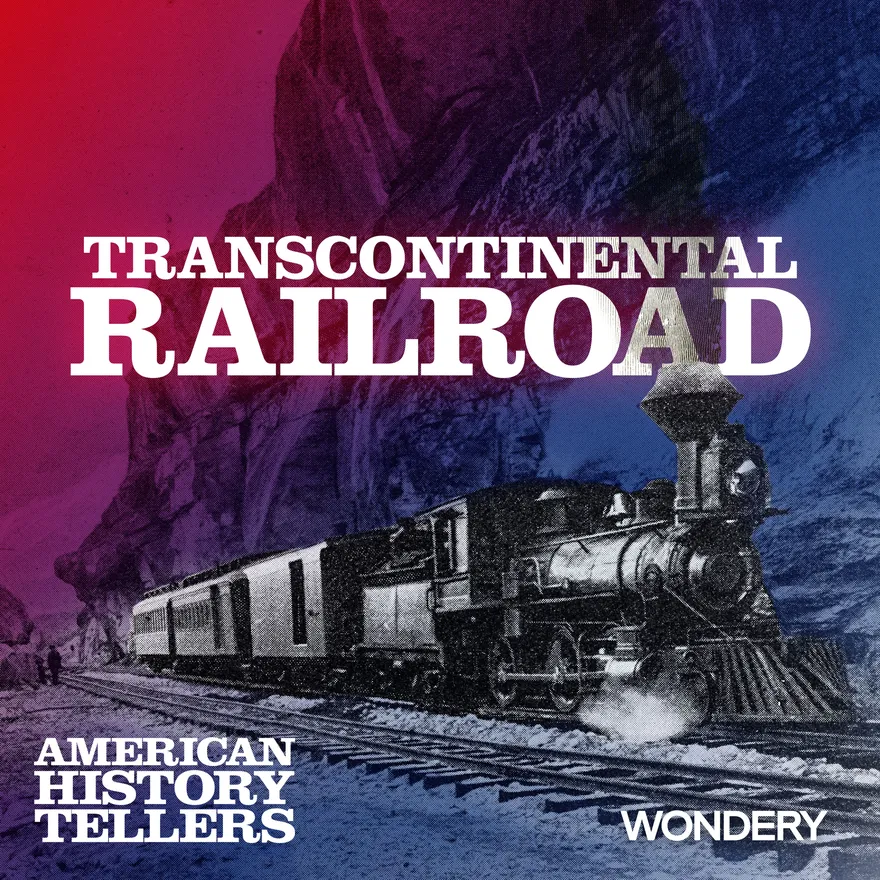
Transcontinental Railroad | The Iron Road | 5
In this episode of American History Tellers, the contributions of Chinese railroad workers are brought to light. For years, the crucial role played by these laborers in constructing the Transcontinental Railroad was whitewashed from the historical narrative. The discussion centers on how iconic images deliberately excluded Chinese workers and how milestone celebrations overlooked their sacrifices.
The episode delves into the challenges of recovering these workers' untold stories due to a lack of records. It also examines recent efforts to recognize the workers' legacy, including centennial commemorations and designation of historic sites. For the Chinese-American community, shedding light on this overlooked history strengthens their connection to the broader American story.
Dec 18, 2024

History Daily: Rugby Union’s “Match of the Century”
This American History Tellers episode delves into one of rugby's most iconic matches — the 1905 contest between New Zealand's undefeated All Blacks and Wales during New Zealand's inaugural European tour. Pitted against each other were New Zealand's dominant side with their signature black uniforms and ritual haka, and the underdog Welsh team steeped in working-class rugby roots.
The summary explores the psychological tactics Wales employed to challenge the vaunted All Blacks, including a pre-game Welsh anthem performance and a revamped offensive playing style. It chronicles the nail-biting, low-scoring match and Wales' historic 3-0 upset over the previously unbeaten All Blacks — a landmark victory that sparked an enduring rivalry between the rugby powers.
Dec 16, 2024

FDR & Churchill: A Friendship For the Ages with History Hit's Dan Snow | 1
In a new episode of American History Tellers, host Dan Snow explores the pivotal friendship between Winston Churchill and Franklin D. Roosevelt during World War II. The blurb covers Churchill's steadfast leadership in rallying the British Empire and the United States against Nazi Germany's ominous expansion across Europe.
It details how Churchill forged a close partnership with Roosevelt, as the two leaders communicated frequently about strategy and coordinated efforts like the D-Day invasion. The episode delves into Churchill's challenges in shoring up confidence on multiple fronts, his strategy of uniting allies against a common threat, and the Allies' deception and military operations leading to the historic D-Day offensive.
Dec 11, 2024

Transcontinental Railroad | The Golden Spike | 4
This episode of American History Tellers delves into the ambitious race to construct the Transcontinental Railroad across the American West in the 19th century. It explores the fierce competition between the Union Pacific and Central Pacific companies as they aggressively pushed their construction crews to lay track westward and eastward respectively. Their showdown was fueled by corruption, labor exploitation, and extreme hardships faced by workers in brutal conditions.
The blurb also examines how insider dealing and bribery by railroad executives enriched them while marginalizing the immigrant laborers who made the railroad possible. Though the railroad's completion was celebrated with a ceremonial golden spike, it came at a steep human cost and facilitated the expansion that decimated Native American populations.
Dec 4, 2024

Transcontinental Railroad | Dancing with a Whirlwind | 2
The American History Tellers podcast delves into the challenges and triumphs of constructing the transcontinental railroad, a monumental feat of engineering and human endurance. The summary explores the financial scheming of Union Pacific Railroad magnate Thomas Durant, who manipulated the corporate structure and exploited government contracts for personal gain.
It also spotlights the Central Pacific Railroad's remarkable achievements amid the formidable Sierra Nevada mountains, from blasting through solid granite to employing thousands of industrious Chinese immigrant workers. The key roles of figures like President Lincoln, engineer Grenville Dodge, and Union Pacific reorganizer Dodge himself feature prominently in this account of a landmark era in American infrastructure.
Nov 20, 2024

History Daily: Introducing Mickey Mouse
This episode delves into the early life and artistic beginnings of Walt Disney, tracing his journey from childhood drawings to his breakthrough success with Mickey Mouse. The summary reveals how Disney's fascination with art and animation led him to pursue his passion, first in Kansas City and then in Hollywood, where financial setbacks ultimately inspired the creation of his iconic mouse.
The episode also highlights Disney's pioneering spirit, chronicling his triumph with "Steamboat Willie," the first animated film with synchronized sound. It culminates with his ambitious and risky endeavor to create the full-length animated feature, "Snow White and the Seven Dwarfs." Despite industry skepticism, the film's success cemented Disney's status as a trailblazer and revolutionary force in the world of animation.
Nov 18, 2024

Transcontinental Railroad | Work of Giants | 1
This podcast episode delves into the engineering challenges and political battles surrounding the construction of the Transcontinental Railroad in the 19th century. It follows the relentless explorations of young engineer Theodore Judah as he surveyed the formidable Sierra Nevada mountains, ultimately devising a detailed plan for tunneling and bridging the rugged terrain.
The episode also examines the efforts to secure funding and support from Congress, as Judah faced intense conflicts between the North and South over the railroad's route. It explores Judah's clashes with private investors, the "Big Four," who undermined his vision through profit-driven schemes like contract manipulation—a power struggle that threatened the project's integrity. The podcast sheds light on the fierce rivalry between the Central Pacific and Union Pacific railroads, each employing underhanded tactics in their race to complete the transcontinental link.
Nov 13, 2024

Listen Now: American Criminal
In this episode of American History Tellers, the podcast explores the criminal exploits of Santé Kimes, who pursued wealth and power through unethical and illegal means. The summary details Kimes' alleged human smuggling operations, where she trapped vulnerable individuals and prevented their departure. It also covers her deceptive tactics to lure students into abusive situations under false pretenses.
Despite periodic reports to authorities, Kimes managed to evade serious consequences for years. When a federal investigation led to her arrest in 1985, she continued manipulating those around her, even attempting to coerce her son into aiding her legal battle. Facing potential decades in prison, Kimes took desperate measures, including faking a medical emergency to escape custody, sparking a manhunt.
Nov 12, 2024

Jamestown | Chief Opechancanough | 5
In this episode of American History Tellers, the podcast examines the life of Opechancanough, a leader within the Powhatan chiefdom. The summary delves into Opechancanough's experiences as a captive in Europe and Mexico, witnessing the horrors of the slave trade that shaped his fervent opposition to colonization.
It chronicles Opechancanough's rise to power, strategically unifying tribes and leading a chiefdom strong enough to pose a formidable threat to the English settlers of Jamestown. Despite initial diplomacy, Opechancanough orchestrated devastating attacks designed to expel the colonists. Though colonization ultimately prevailed, the summary highlights how the Powhatan people honor Opechancanough's legacy of resistance against overwhelming odds.
Nov 6, 2024

Jamestown | The Great Reforms | 4
In this episode of American History Tellers, the discussion centers on the fragile beginnings of the Jamestown colony and its tumultuous relationship with the Powhatan tribe. The summary details Chief Opiconkono's meticulously planned surprise attack on English settlements, which nearly led to the colony's collapse.
The episode also delves into the political and economic developments that shaped Virginia—the establishment of democratic institutions like the Virginia General Assembly and the rise of tobacco cultivation, which fueled the demand for enslaved labor. The hardships, mismanagement, and lasting effects of this era shed light on the complex history of colonial America's foundations.
Oct 30, 2024
Create Summaries for anything on the web
Download the Shortform Chrome extension for your browser


Listen Now: The Real History of Dracula
In this episode of American History Tellers, the discussion centers around Bram Stoker's iconic novel Dracula and its enduring cultural impact. The show explores the literary inspirations and themes Stoker drew upon to create his legendary vampire tale, including ancient folklore, medieval history, and contemporary Victorian fears.
The blurb delves into how Stoker meticulously crafted Dracula to resonate with deeper anxieties about societal progress, gender roles, and the "other." It examines how this classic horror story established quintessential vampire tropes and continues to influence the genre today by serving as a vessel for exploring mortality and the human psyche.
Oct 29, 2024

Jamestown | The Starving Time | 3
In this episode of American History Tellers, the summary explores Jamestown's descent into starvation and conflict in the early 1600s. As the colony's population rapidly grew, scarce resources and clashes with local Native American tribes over land and food exacerbated tensions on all sides. The colonists resorted to increasingly violent measures to gain control over the Powhatan region and ensure their survival.
The episode summary details the crumbling of leadership and order in Jamestown during the "starving time," and the drastic disciplinary measures taken by new governors as they expanded settlements along the James River. It depicts a collision of cultures surrounding Pocahontas' abduction and subsequent marriage after embracing Christianity, representing the turbulent transformation of the Virginia colony.
Oct 23, 2024

Jamestown | A Hell of Darkness | 2
In this episode of American History Tellers, the summary explores the fragile early days of the Jamestown colony. Facing catastrophic disasters, fires, disease, and near starvation in the first year, the English settlers were forced to rely entirely on aid from the Powhatan tribe led by Paramount Chief Powhatan to survive the harsh winter.
However, tensions quickly escalated due to aggressive tactics and violations of agreements by colonists like John Smith. As the colonists fixated on seeking riches like gold, ignoring priorities like fortifying and farming, their single-minded pursuit clashed with the reality of establishing a self-sufficient colony.
Oct 16, 2024

Listen Now: The Best Idea Yet
The American History Tellers podcast is set to unveil a new series, "The Best Idea Yet," hosted by Lindsay Graham. Graham aims to explore the unexpected origin stories behind familiar household products and brands that we often take for granted.
From the McDonald's Happy Meal to Sriracha hot sauce to the board game Monopoly, Graham promises to reveal the surprising backstories and diverse individuals who sparked these iconic innovations. Whether born from a mother's practical goals or an immigrant entrepreneur's ambition, the origins will showcase the inspiration that can arise from unexpected sources. Tune in as Graham uncovers the richness and diversity lying beneath everyday items we seldom stop to consider deeply.
Oct 15, 2024

History Daily: Breaking the Sound Barrier
In this episode of American History Tellers, the focus is on Chuck Yeager's legendary career as a fighter pilot and test pilot. His heroics in WWII, shooting down numerous enemy planes and evading capture, are recounted. The summary then details Yeager's involvement in the top-secret X-1 program and the technical challenges faced in attempting to break the sound barrier.
Yeager's perseverance and skill ultimately led to his historic achievement on October 14, 1947—becoming the first pilot to fly faster than the speed of sound. This groundbreaking supersonic flight cemented Yeager's place in aviation history and would define his career for decades to come.
Oct 14, 2024

Jamestown | Land of Milk and Honey | 1
In this episode of American History Tellers, the early days of the Jamestown colony in Virginia are explored. You'll learn about the royal charter granted by King James I to the Virginia Company of London to establish an English settlement in North America, fueled by hopes of commercial gain and territorial expansion.
The blurb recounts the colonists' tumultuous arrival in 1606 and their interactions with the powerful Powhatan empire led by Chief Powhatan. It details the hardships the new arrivals faced, including famine, disease, and power struggles. Despite these challenges, the English settlers maintained their ambitions for Virginia's commercial potential.
Oct 9, 2024

The Titanic | The Obsession | 4
This episode of the American History Tellers podcast explores the enduring fascination with the Titanic disaster. It examines the fateful collision with an iceberg and the tragic loss of life that followed, as well as the pioneering efforts to locate and raise the wreck in the decades after the sinking.
The discussion covers the advent of modern media that enabled widespread reporting of survivor stories, fueling public obsession with the Titanic. It also delves into the subsequent emergence of a "Titanic economy" involving artifacts, replicas, and cultural symbolism of the disaster's dramatic themes of human error, perseverance, and maritime innovation.
Oct 2, 2024

History Daily: Suleiman the Magnificent
In this episode of American History Tellers, explore the life and legacy of Suleiman the Magnificent, the 10th Ottoman Sultan. Suleiman ascended to the throne in 1520 with grand ambitions beyond territorial expansion. Listeners will learn about his sweeping legal and administrative reforms that earned him the title "Suleiman the Lawgiver," as well as his unconventional marriage to Roxelana, a former slave elevated to royalty.
The episode also delves into the power struggles and court dynamics during Suleiman's reign, including clashes between his influential wife and the Grand Vizier Ibrahim. Despite personal losses later in life, Suleiman left behind an enduring legacy as the ruler who ushered in the Ottoman Empire's golden age through his transformative reforms.
Sep 30, 2024

The Titanic | Orphans of the Deep | 3
In the aftermath of the Titanic's sinking, this episode examines survivors' harrowing accounts and the immense public grief. It explores the inquiries into the disaster that spurred reforms like requiring more lifeboats and wireless communication on ships.
The long-term legacy and impact of the tragedy are also detailed. The episode covers the eventual discovery of the wreckage in 1985 and renewed global fascination following Robert Ballard's expeditions and James Cameron's film. While recognizing technological advancements stemming from the Titanic, the episode reflects on the ethics of retrieving artifacts from the gravesite and the sinking's enduring symbolic significance.
Sep 25, 2024

Listen Now - Criminal Attorney
From banking to the FBI, this episode follows Shawn Brokos' career shift driven by a desire for adventure and purpose. Shawn gives an inside look at the FBI's use of informants—dubbed "confidential informants"—to gather intelligence on criminal organizations, a controversial tactic criticized for prioritizing statistics over effective crime reduction.
The episode also delves into the high-stakes methods involved in recruiting informants, as Shawn recounts pressuring Kimo DeShawn McCray, a Crips affiliate with a criminal record, to become an informant for the FBI after catching him with an illegal sawed-off shotgun. By leveraging his fear of more jail time, Shawn secured Kimo's cooperation, shedding light on the reality of gathering intelligence within the criminal underworld.
Sep 23, 2024

The Titanic | She's Doomed | 2
The American History Tellers podcast examines the Titanic disaster, focusing on the harrowing final hours aboard the ill-fated ship. On the night of April 14, 1912, the unthinkable occurred—an iceberg collision caused severe flooding. This summary details the frantic evacuation, with lifeboats leaving partly full as panic set in, separating many families.
It also covers the wrenching final moments as the stern rose vertically before the ship broke apart, plunging hundreds into the frigid waters. As the nearby Carpathia arrived to aid the survivors, the survivors began a somber journey, grieving the immense loss amid the burgeoning blame game. The Titanic disaster prompted vital maritime safety changes—this summary provides an unflinching look at that fateful night's seminal moments.
Sep 18, 2024

History Daily: The Wall Street Bombing
The American History Tellers podcast explores a significant event in US history—the 1920 Wall Street bombing, the deadliest act of terror on American soil at that time. The episode delves into the rise of anarchism and bombings in the late 19th century, fueled by wealth inequality and a desire for violent overthrow of capitalist systems.
It discusses the 1919 terror campaign of parcel bombings by anarchists, culminating in the Wall Street bombing. The attack occurred amid heightened tensions between the US government and suspected anarchists like Sacco and Vanzetti following other bombings that year. The blurb sets the stage for an episode examining the troubling event and its aftermath, as authorities failed to conclusively identify the perpetrators.
Sep 16, 2024
Create Summaries for anything on the web
Download the Shortform Chrome extension for your browser


The Titanic | Unsinkable | 1
In this episode of American History Tellers, the podcast explores the origins of the ill-fated Titanic, the engineering marvel of its time. It covers the rivalry between White Star Line and Cunard Line, and the collaborative efforts of Bruce Ismay and Lord Pirrie to outdo Cunard with the construction of the Titanic and its sister ship Olympic. The ship's innovative design by Thomas Andrews is discussed, including its "practically unsinkable" claim due to its massive size and watertight compartments.
The episode also delves into the preparations before the Titanic's maiden voyage, capturing the chaotic final moments of boarding and the stark class divides onboard. It teases the fateful events that transpired on the night of April 14th, when the ship struck an iceberg, leading to a disastrous chain of events that compromised its purported unsinkability.
Sep 11, 2024

Listen Now - Empire City: The Untold Origin Story of the NYPD
The NYPD's origins in the 1800s were marred by controversial practices such as kidnapping Black New Yorkers and selling them into slavery. This troubling history stands in stark contrast to the department's current heroic image and global brand recognition.
This episode explores the challenges researchers face in uncovering the NYPD's true past, including censorship and limited access to official sources. It examines the ways the NYPD has carefully curated its public image over the years—by whitewashing its unsavory records, cultivating iconic imagery and pop culture depictions, and relying on a symbiotic relationship with the media to reinforce its positive reputation worldwide.
Sep 10, 2024

Encore: Presidential Assassinations | Ricochet | 5
In this episode of American History Tellers, the spotlight shines on the 1981 assassination attempt on President Ronald Reagan by John Hinckley Jr. outside the Washington Hilton Hotel. The episode delves into Hinckley's disturbed motivations, stemming from an obsession with actress Jodie Foster, and the harrowing moments as a Secret Service detail rushed Reagan to the hospital for life-saving treatment amid chaos and confusion within the White House.
The blurb also touches on the insanity defense presented by Hinckley's attorneys, which led to his acquittal and commitment to a psychiatric hospital, prompting subsequent legal reforms. Ultimately, the episode examines how Reagan's survival bolstered his popularity and conservative agenda, cementing his resilient image and influential legacy.
Sep 4, 2024

History Daily: The Great Fire of London Begins
This episode of American History Tellers explores the Great Fire of London in 1666. As the fire devoured London's timber-framed buildings, witness Samuel Pepys alerted King Charles II, who took charge of the response efforts. Key figures like the King and architect Christopher Wren are highlighted, as the episode details the catastrophic destruction and aftermath of the historic blaze.
From the first sparks at the Pudding Lane bakehouse to the rebuilding of structures like St. Paul's Cathedral, this episode examines the Great Fire's impact on 17th-century London. It paints a vivid picture of the inferno's spread, the frantic attempts to control it, and how the tragedy paved the way for innovative urban planning in the English capital.
Sep 2, 2024

Encore: Presidential Assassinations | Three Shots in Dallas | 4
In this episode of American History Tellers, the details surrounding President John F. Kennedy's assassination in Dallas are examined. The narrative unravels the tragic event, from Lee Harvey Oswald's vantage point to the Secret Service's security concerns that day. It explores how Lyndon B. Johnson swiftly assumed the presidency and seized the nation's grief to advance Kennedy's legislative agenda, including the Civil Rights Act.
Yet, the assassination left an enduring shroud of mystery and doubt. The podcast delves into the numerous conspiracy theories that emerged, reflecting the growing public cynicism towards government in that era. While providing insight into this pivotal moment in American history, the episode ultimately highlights the lasting impact Kennedy's assassination had on the nation's psyche.
Aug 28, 2024

Encore: Presidential Assassinations | Anarchist at the Exposition | 3
This episode of American History Tellers examines the life and presidency of William McKinley, shining a light on his pivotal role in America's economic recovery and rise as a global power. It explores the events surrounding his assassination by Leon Czolgosz, an anarchist factory worker radicalized by the harsh realities facing many workers during America's industrialization.
The summary delves into Czolgosz's motivations, the assassination attempt at the Pan American Exposition, and the consequences, including a crackdown on anarchist activities and the ascension of Theodore Roosevelt to the presidency. McKinley's death catalyzed Roosevelt's proactive domestic and foreign policies, accelerating America's path towards global dominance.
Aug 21, 2024

History Daily: A Failed Coup in Moscow
In an episode of the American History Tellers podcast, the failed coup attempt in Moscow in August 1991 is explored. As Soviet leader Mikhail Gorbachev implemented reforms aimed at modernizing and liberalizing the USSR, a group of communist hardliners grew concerned about the potential disintegration of Soviet control.
These hardliners, known as the "Gang of Eight," plotted to overthrow Gorbachev and maintain the Soviet Union. Their coup attempt saw Gorbachev's arrest, troops in Moscow, and the installation of an acting president. However, Boris Yeltsin rallied citizens to resist the coup, culminating in a refusal by the military to use force against the defiant crowds. This critical event accelerated the dissolution of the USSR, with Gorbachev's resignation and declaration of its illegality.
Aug 19, 2024

Encore: Presidential Assassinations | Murder for Spoils | 2
In this episode of American History Tellers, the tumultuous aftermath of President James Garfield's assassination is examined. Garfield's presidency was marked by a division within the Republican Party regarding the spoils system—the practice of awarding government jobs for political support. His efforts to curtail this corruption put him at odds with Stalwart leader Roscoe Conkling, ultimately leading to a critical blow against the spoils system.
Yet Garfield's death at the hands of a delusional assassin had even greater consequences. His prolonged, agonizing demise exposed the gross incompetence of his medical team and fueled public outcry for civil service reform. It was this outrage over Garfield's martyrdom that finally culminated in the Pendleton Civil Service Act, ending the spoils system and establishing merit-based hiring.
Aug 14, 2024

Encore: Presidential Assassinations | Protecting POTUS (NEW) | 1
In this episode of American History Tellers, Carol Leonnig explores the evolution of the Secret Service, from its origins as a unit combating counterfeiting to its current role as the president's protectors. She details how major incidents like the Kennedy assassination prompted sweeping reforms, while recent scandals exposed vulnerabilities that persist today.
Despite measures like increased training and diversity initiatives, Leonnig reveals that the agency continues to face significant challenges. Resource constraints, staffing issues, and a damaged public image remain obstacles in fulfilling the Service's critical mission. The episode sheds light on the complexities surrounding presidential security and examines the steps—and missteps—taken by this storied agency.
Aug 7, 2024

History Daily: The Lonesome Cowboys Raid
In this episode of American History Tellers, the summary explores the tumultuous history of the LGBTQ+ rights movement in the United States. The first part sheds light on the government's anti-LGBTQ+ policies and crackdowns in the post-WWII era, fueled by Senator McCarthy's inflammatory rhetoric and the Lavender Scare.
The second part focuses on two pivotal events that sparked activism: the 1969 Stonewall Riots in New York and the raid on the Ansley Mall Theatre, Atlanta's sole LGBTQ+ safe space. The summary details how these incidents catalyzed the formation of rights groups, voter registration drives, and the first Pride marches, leaving a lasting impact on the fight for LGBTQ+ visibility and equality.
Aug 5, 2024

First Ladies | No Handbook | 6
In this episode of American History Tellers, the experience of First Ladies is explored, highlighting the intense public scrutiny and lack of privacy they face. The summary provides insights into the unique challenges of navigating an uncharted role without formal training or protocol. It examines how First Ladies turn the White House into their personal space, offer support and counsel to the President, and find ways to balance public visibility with private life.
Anecdotes from past First Ladies illustrate the strong bonds of empathy they share, transcending political differences. The summary reveals strategies employed by First Ladies to carve out privacy and normalcy, demonstrating the ever-present spotlight on their choices and public image. Through these glimpses into the lives of First Ladies, the podcast episode summary sheds light on the complexities of this high-profile role.
Jul 31, 2024

First Ladies | Michelle Obama | 5
In this episode of American History Tellers, the spotlight shines on Michelle Obama's upbringing, education, and advocacy work before and after her tenure as First Lady of the United States. The blurb chronicles Michelle's journey from her childhood in Chicago's South Side to her academic achievements at elite institutions like Princeton. It explores her early relationship with Barack Obama and her evolving roles supporting his political ambitions.
The episode delves into Michelle's initiatives and priorities during her time in the White House, including her efforts to promote children's health, support military families, and increase educational opportunities for girls. It also touches on her post-White House endeavors to empower young women and increase voter participation, solidifying her legacy as a champion of social justice.
Jul 24, 2024
Create Summaries for anything on the web
Download the Shortform Chrome extension for your browser


History Daily: The End of the Warsaw Ghetto
In this episode of American History Tellers, the Nazi regime's establishment and subsequent brutality in the Warsaw Ghetto is explored. Details of the Nazis' "Final Solution" and their systematic, industrial methods for exterminating Jews are revealed. The summary recounts the Nazis' deportations of Warsaw Ghetto residents to the Treblinka extermination camp, the horrors of the gas chambers, and the uprising that took place in resistance against these atrocities.
While ultimately crushed, the heroic Warsaw Ghetto Uprising highlighted the spirit of Jewish resistance. The summary also sheds light on the Nazi efforts to conceal their genocide, from dismantling Treblinka to burying victims' remains and attempting to construct a peaceful farmhouse facade. However, as history shows, this unprecedented brutality could not remain hidden.
Jul 22, 2024

First Ladies | Betty Ford | 4
This American History Tellers episode delves into the life of Betty Ford, who rose from humble beginnings as a dance teacher to become a pioneering First Lady. The summary explores how Ford's candor and progressive views on topics like abortion and addiction sparked both backlash and admiration during her time in the White House.
It also chronicles Ford's personal struggles with substance abuse and her subsequent recovery journey, which inspired her to found the Betty Ford Center and advocate for addiction treatment. The summary provides insight into Ford's advocacy for health issues and women's rights after leaving the White House, highlighting her lasting impact as a forward-thinking public figure.
Jul 17, 2024

First Ladies | Eleanor Roosevelt | 3
In this episode of American History Tellers, the summary explores Eleanor Roosevelt's early life—marked by trauma, loss, and adversity—and the pivotal role it played in shaping her resilience and commitment to service. The podcast delves into Eleanor's unconventional marriage to Franklin, detailing how their bond evolved as she supported his political ambitions while forging her own path in advocacy and activism.
As Franklin's political career progressed, the discussion shifts to Eleanor's rise as a public figure in her own right. Her dedication to causes like women's suffrage and labor rights intensified after discovering her husband's infidelity. When Franklin contracted polio, Eleanor compensated by working to conceal his condition while cultivating influence through her advocacy roles.
Jul 10, 2024

First Ladies | Mary Todd Lincoln | 2
In this episode of the American History Tellers podcast, the complicated life and legacy of Mary Todd Lincoln take center stage. Despite her prominent upbringing and passionate support of her husband's political ambitions, Mary faced immense tragedy and struggled with mental health issues, contributing to her polarizing reputation as First Lady.
The summary explores Mary's defiant disregard for traditional norms and her extensive political influence, which drew both ire and admiration. It delves into the profound grief she endured following the deaths of her sons and her erratic behavior after the assassination of Abraham Lincoln, which ultimately led to her involuntary commitment. Though perceived as extravagant and eccentric by her critics, Mary's impact on the White House cannot be overlooked.
Jul 3, 2024

Listen Now: Even the Royals
In this episode of American History Tellers, the relationship between Catherine of Aragon and Henry VIII is explored. Initially portrayed as loving and playful, the marriage strained over time due to Catherine's inability to produce a male heir. The episode reveals Henry's infidelity and public humiliation of Catherine through the acknowledgment of his illegitimate son.
While Catherine proved herself a capable queen by defeating the Scots, her primary duty of securing the Tudor line overshadowed all else. The summary discusses Catherine's unwavering defense of her daughter Mary's claim to the throne despite Henry's actions.
Jul 2, 2024

First Ladies | Martha Washington | 1
This episode of American History Tellers explores the life and influence of Martha Washington, the nation's first First Lady. It delves into her personal journey, from her upbringing on a Virginia plantation to her marriage to George Washington and their shared sacrifices during the Revolutionary War.
The blurb examines Martha's role in shaping the First Lady's position, establishing traditions like formal receptions and sparking criticism for emulating royal courts. It also sheds light on the controversies the Washingtons faced, such as accusations of elitism and anti-Republican sentiments, as well as their complex stance on slavery, exemplified by Martha's entanglement with the injustices of the institution.
Jun 26, 2024

History Daily: The End of the Münster Rebellion
In this episode of American History Tellers, the origins and key events of the Münster Rebellion are explored. The Protestant Reformation catalyzed this uprising, as radical preachers like Melchior Hoffmann propagated apocalyptic visions. Their disciple, Jan Matthias, led the Anabaptist takeover of Münster in 1534, imposing an authoritarian social order.
After Matthias' death, Jan van Leiden declared himself king, instituting polygamy and brutally punishing dissenters. The episode examines how the Catholic bishop eventually crushed the rebellion through a surprise attack in 1535. Van Leiden and other leaders faced public torture and execution, marking the end of Anabaptist challenges to the social order across Europe.
Jun 24, 2024

Benjamin Franklin | The Flame of Liberty | 2
In the American History Tellers podcast, Michael Barbaro chronicles Benjamin Franklin's transformation from a loyal British subject into a leader of the American Revolution. The episode delves into Franklin's disillusionment with Britain's oppressive measures, fueled by humiliation in London and a bitter rift with his loyalist son. It explores Franklin's pivotal role in securing France's alliance through his charm offensive and warnings about American defeat's consequences.
The blurb also touches on Franklin's pragmatic leadership in the Continental Congress, his mediation efforts at the Constitutional Convention, and his later abolitionist stance. Listeners gain insight into Franklin's complex personal life and shifting views as he became a Founding Father committed to the cause of American independence.
Jun 19, 2024

Benjamin Franklin | Join or Die | 1
On American History Tellers, this episode explores Benjamin Franklin's multifaceted life and legacy. From his modest beginnings as a printer and publisher, Franklin becomes a prominent figure in the American colonies. The episode details his groundbreaking scientific discoveries in electricity, his practical inventions like the lightning rod, and his efforts to establish societal institutions like libraries and fire departments.
But Franklin's influence extends beyond his scientific achievements into the political sphere. As colonial tensions with Britain escalated, he advocated for greater unity and representation, eventually shifting towards supporting the revolutionary cause after being dismissed by the British. This episode offers insights into Franklin's role in shaping the fledgling nation through his diverse endeavors.
Jun 12, 2024

Listen Now: Wow in the World's Summer of Wow!
What if you could travel back in time to explore an ancient beach on Mars? In this episode, hosts Mindy Thomas and Guy Raz consider this mind-bending scenario. Mindy proposes visiting a Martian beach for more seclusion and privacy, though Guy initially questions how a beach could exist on a planet without water.
They discuss the challenges of adapting to Mars' extreme cold and the possibility of using futuristic technology, like the "wow machine," to travel through time and space. The episode explores the stark differences between ancient Mars, with its abundant surface water, and the planet's current arid conditions. The conversation raises intriguing questions about the hypothetical future of an inhabitable Mars versus the untouched landscape of its distant past.
Jun 11, 2024

History Daily: The First Execution of the Salem Witch Trials
In this episode about the Salem Witch Trials, American History Tellers examines the origins of the accusations that sparked the hysteria. Salem Village was gripped by fear when several young girls, including the daughter of Reverend Parris, exhibited bizarre behaviors that a doctor attributed to witchcraft. This led to the arrests of three women and a series of accusations, trials, and executions.
The podcast explores how the trials spread, convicting and executing even respected members of the community like Martha Corey and Bridget Bishop — the first person hanged for witchcraft in 1692. It recounts how the governor eventually abolished the special court but not before irreparable damage was done, with many accused witches executed based on dubious evidence and spectral testimonies.
Jun 10, 2024

The Hidden History of the White House | 1
In this episode of American History Tellers, the hidden history of the White House is explored. The podcast unveils the White House's origins, including the role played by enslaved Black workers and indentured servants in its construction. It sheds light on the crises and scandals that have unfolded within its walls, from fires and chaotic inaugurations to covert illnesses and scandalous recordings.
The blurb also delves into the dedication of the White House staff, whose tireless efforts have kept the iconic residence functioning through the years. The episode highlights how the White House has reflected America's progress, with milestones like the first dinner with an African American guest marking the path toward greater inclusivity. Ultimately, the White House emerges as a symbol of American democracy, resilient and unchanging in its core principles.
Jun 5, 2024
Create Summaries for anything on the web
Download the Shortform Chrome extension for your browser


Exclusive Preview : The Hidden History of the White House
This episode of American History Tellers delves into the rich history of the White House, from its origins and physical evolution to the influential figures and power dynamics that have shaped it. The podcast explores the building's construction and the role of enslaved African Americans and immigrants in its creation. It also sheds light on lesser-known individuals who played pivotal roles behind the scenes, including Edith Wilson, Kate Warren, and Paul Jennings.
The episode further examines how the White House has served as a backdrop to America's rise as a global superpower, witnessing key events and conflicts. The podcast details how the building's international role has grown, hosting landmark treaties and shaping foreign policy decisions that impact the world stage. Through these stories, the White House emerges as a symbol of the nation's history, its challenges, and its influence on the global landscape.
May 30, 2024

The Pinkerton Detective Agency | Behind The Brand | 4
In this episode of American History Tellers, the origins and evolution of the Pinkerton National Detective Agency are explored. The story traces Alan Pinkerton's transition from cooper to detective, building a reputation for determination and skilled investigation. It examines Pinkerton's early brand management strategies, including publishing embellished accounts of his exploits, establishing a code of conduct, and portraying detectives as educated professionals.
The agency's role in labor disputes and violent confrontations like the Homestead strike are discussed, which damaged Pinkerton's public image and prompted legislative efforts to curb its power. The episode covers the agency's pivot to espionage work and sheds light on its current operations under Securitas, including legal action to protect the Pinkerton name and legacy.
May 29, 2024

History Daily: A B-24 Crash Survivor Begins a Fight for Survival
In American History Tellers, this episode chronicles Louis Zamperini's incredible story of survival. From his Olympic athletic career and competing at the 1936 Berlin Olympics to his WWII bomber crashing at sea, Zamperini endured 47 horrific days stranded before being captured as a prisoner of war.
The episode details the brutal mistreatment Zamperini faced in Japanese POW camps, where he struggled through deprivation and trauma. After liberation, presumed dead, Zamperini returned home, battling alcoholism before his wife's support helped him find forgiveness. Zamperini's perseverance amid unimaginable adversity serves as an inspiring testament to the strength of the human spirit.
May 27, 2024

The Pinkerton Detective Agency | The Public Eye | 3
The Pinkerton Detective Agency's origins and evolution are explored in this episode of American History Tellers. Founded in the 1850s by Alan Pinkerton, the agency gained prominence for tracking Confederate spies during the Civil War and pursuing iconic outlaws like Butch Cassidy and the Sundance Kid.
However, the Pinkertons also faced widespread backlash for their controversial role in violently suppressing labor unions and strikes on behalf of corporate interests. The episode details the agency's shifting priorities, from pioneering crime-fighting techniques later adopted by the FBI, to transforming into a modern corporate security firm specializing in services like cybersecurity.
May 22, 2024

The Pinkerton Detective Agency | Brothers and Sons | 2
In this episode on the Pinkerton Detective Agency, its rise to fame is explored, including Alan Pinkerton's wartime exploits and pursuit of notorious outlaw gangs like Jesse James and Butch Cassidy. As the agency expanded under new leadership, providing security for corporations during labor unrest, the summary examines the violent Homestead Steel strike and ensuing public backlash against Pinkerton's anti-labor tactics.
The episode traces how the agency later adapted its business model, scaling back security operations to investigate train robbers and bank thieves while forging partnerships with federal law enforcement. Pinkerton's transition from a famed detective agency to a controversial security force amid changing times is examined.
May 15, 2024

History Daily: The Attempted Assassination of Pope John Paul II
This episode explores the attempted assassination of Pope John Paul II on May 13, 1981. It delves into the background of would-be assassin Mehmet Ali Ağca, a Turkish man with ties to a far-right group, as well as the potential external forces that may have supported his actions. The Pope's origins in occupied Poland and the significance of his 1979 visit, which challenged communist control, are also examined.
Particular emphasis is placed on the Pope's remarkable act of forgiveness—embracing Ağca in prison in 1983 and later advocating for his pardon. Their reconciliation and the lasting impact of the Pope's benevolent stance towards his attacker provide a powerful testament to his belief in redemption.
May 13, 2024

The Pinkerton Detective Agency | "We Never Sleep" | 1
This episode of American History Tellers delves into the origins and evolution of the Pinkerton Detective Agency, a pioneering private security firm founded by Scottish immigrant Alan Pinkerton. From Pinkerton's beginnings as a barrel maker-turned-deputy sheriff to the agency's groundbreaking work against counterfeiting and mail theft, listeners gain insight into the organization's rise and diversification in the 19th century.
The episode explores the Pinkerton Agency's crucial role in thwarting an assassination plot against President Lincoln and providing intelligence to the Union during the Civil War. It also examines the agency's post-war challenges, including combating train robberies, criticism of its methods, and conflict within the Pinkerton family as the firm rapidly expanded its operations.
May 8, 2024

World War I | "Heaven, Hell, or Hoboken" | 5
In this American History Tellers episode, the United States' rapid transformation from military unpreparedness at the outset of World War I to becoming a global military power by the war's end is explored. The early debate around potential US involvement, overshadowed by Wilson's preference for neutrality, eventually gave way to the establishment of a draft and an expedited training process that churned out over a million new soldiers at 32 camps across the country.
The episode sheds light on the African American troop experience, recounting both the discrimination they faced and the perspective-altering interactions that fueled their civil rights movement upon returning home. It also spotlights key WWI battles like Meuse-Argonne, the valor of soldiers like the Lost Battalion, and the war's abrupt conclusion—serving as a prelude to America's continued rise on the global stage.
May 1, 2024

History Daily: Rock Musical Rent Debuts on Broadway
In this episode of American History Tellers, the spotlight falls on the groundbreaking musical "Rent." The summary chronicles the show's origins, tracing its evolution from an initial adaptation of Puccini's "La Bohème" into a poignant portrayal of New York's East Village in the midst of the AIDS crisis.
The tragic loss of the show's creator Jonathan Larson on the eve of its debut lends the narrative a profound poignancy. Yet, the summary also celebrates the musical's triumph: its widespread critical acclaim, its Tony and Pulitzer wins, and its enduring legacy as a cultural phenomenon that resonated deeply with audiences while raising awareness and funds for HIV/AIDS causes.
Apr 29, 2024

World War I | The Eleventh Hour | 4
In the final episodes covering World War I, American History Tellers explores the intense battles that led to Germany's ultimate surrender, including the Meuse-Argonne Offensive that broke through the formidable Hindenburg Line. The episode then examines President Wilson's idealistic vision for a postwar global order centered on his Fourteen Points and the League of Nations — a vision that clashed with the pragmatic interests of Allied leaders like Clemenceau and Lloyd George.
Back in America, Wilson faced domestic opposition from Republicans regarding the League's implications for Congressional war powers. The episode also touches on the transformations shaping American society, from the country's rise as a major military force to the expansion of federal policing powers curbing civil liberties during wartime.
Apr 24, 2024

World War I | The Spring Offensive | 3
This episode of American History Tellers delves into the United States' struggles during World War I to meet wartime production demands. It examines the government's efforts to coordinate and streamline industry through the War Industries Board, led by Bernard Baruch. However, these measures faced resistance from private businesses wary of government interference in their operations.
The summary also explores the rising public hostility towards German-Americans during the war, with instances of persecution and suppression of German culture. Additionally, it highlights the unequal treatment experienced by African-American soldiers, who were relegated to labor roles by the U.S. military despite their bravery being recognized by French allies.
Apr 17, 2024

History Daily: The Hillsborough Stadium Disaster
American History Tellers delves into the Hillsborough Stadium disaster, a crowd crush tragedy that unfolded during an FA Cup match in 1989, claiming 96 lives. The episode explores the devastating events that transpired, including the slow emergency response and the heartbreaking loss of many youths, plunging Liverpool into grief.
It also sheds light on the aftermath: authorities' attempts to cover up failures, the steadfast campaign by victims' families for truth and accountability, and the eventual revelation of negligence as the root cause. Moving beyond revisiting the tragedy itself, the episode examines the disaster's lasting impact on the Liverpool community, from strengthening fan bonds with the club to ongoing memorials and the continued pursuit of justice.
Apr 15, 2024
Create Summaries for anything on the web
Download the Shortform Chrome extension for your browser


World War I | The Yanks Are Coming | 2
This episode of American History Tellers delves into the United States' road to World War I. The summary details Germany's provocations, including the Zimmermann Telegram that outraged the American public, and President Wilson's eventual decision to portray the war as a moral crusade to defend democracy.
It also explores the significant challenges faced by the ill-prepared US military, necessitating rapid mobilization through the draft and recruitment drives. Additionally, the summary touches on the domestic front, shedding light on the industrial expansion's struggles, the government's propaganda efforts, and the monitoring of German-Americans and draft dodgers.
Apr 10, 2024

Listen Now: The Cat in the Hat Cast
Join the chaotic adventure in the latest episode of American History Tellers, where Fish finds his usual podcast tranquility in delightful disarray thanks to the antics of Cat, the unpredictable feline co-star. As Fish navigates through themes of peace and proper etiquette, Cat hijacks the show, trotting in with a mischievous plan to churn the calm waters with a host of little cats, whose presence and impromptu theme song flip the script on Fish's well-laid plans. Amid technical miscues and purring disruptions, this episode shows just what happens when a methodical host meets a whiskered whirlwind with a flair for the unexpected.
In a turn as spontaneous as it is whimsical, Cat takes the spotlight, unleashing a whimsical performance that shines on the charm and quirkiness of the letter A. With the help of the concealed kitties from his hat, Cat orchestrates a silly serenade that adds a dash of absurdity and laughter to the podcast. Dive into this amusing tableau as American History Tellers presents a blend of frivolity and furry friends, creating an entertaining mash-up that keeps listeners guessing what will come next.
Mar 7, 2024

The Underground Railroad | Harriet Tubman’s Goodbye Song | 5
Dive deep into the courageous life of Harriet Tubman in the latest episode of American History Tellers with host Lindsay Graham and guest Angela Crenshaw. Explore Tubman's daunting past, learning about the harsh conditions of her early life in Maryland, which shaped her into a symbol of strength and determination. As you delve into the narrative, uncover the painful memories that fueled her resolve, from the separation from her family to the brutal conditions she and her mother endured, painting a poignant picture of her indomitable spirit in the face of dire circumstances.
The episode not only chronicles Tubman’s personal saga but also sheds light on the intricate operations of the Underground Railroad, highlighting the crucial roles of abolitionists and the ingenious methods utilized to navigate the journey to freedom. With the enactment of the Fugitive Slave Act of 1850, delve into the adaptions required to overcome increasing dangers. Furthermore, learn of Tubman's lesser-known contributions as a Union spy, scout, and leader during the Civil War, where she executed daring missions, such as the Combahee River Raid, and grapple with the sobering recognition she received for her valiant efforts.
Mar 6, 2024

History Daily: Conquistador Hernán Cortés Arrives In Mexico
Embark on a tumultuous journey through time with American History Tellers, where in this episode, hosts Lindsay Graham, Ash Kelley, and Alaina Urquhart delve into the complex narrative of Hernán Cortés' arrival in Mexico and the ensuing conquest that forever altered the course of history. Explore the strategies, conflicts, and critical decisions that led to the fall of a mighty empire, a story drenched in both ambition and tragedy.
Uncover how Cortés' initial clashes with the Maya escalated into aggressive conquests, how alliances with disgruntled indigenous groups bolstered his campaign, and the fateful moment Cortés cut off any possibility of retreat by scuttling his own ships. This narrative captures the catastrophic impact of European diseases on native populations and the culmination of a two-year-long saga that resulted in the downfall of the Aztec empire and its Emperor Montezuma. Join us for a gripping recount of this pivotal moment in the tapestry of the New World’s history with the American History Tellers.
Mar 4, 2024

The Underground Railroad | Journey’s End | 4
Dive into a pivotal chapter of American history with "American History Tellers," where host Lindsay Graham shines a light on the audacious acts of defiance and the clandestine operations that fuelled the legendary Underground Railroad. Discover how this stealthy network became an iconic beacon of resistance, playfully mocking the Fugitive Slave Act as it spirited countless enslaved individuals towards freedom. From the spirited rescue of Jerry in Syracuse to the robust legal and public challenges against slave-catching laws, the episode reveals how a collective Northern pushback reshaped public sentiment and increasingly made the impossible seem achievable.
In this episode, Graham also examines the indomitable spirit and strategic genius of Harriet Tubman, who not only led dozens to liberty but also served valiantly for the Union war effort. Additionally, explore the immense cultural impact of Harriet Beecher Stowe's seminal novel, "Uncle Tom's Cabin," and the revolutionary yet ill-fated visions of John Brown's "subterranean passway." This moving saga uncovers the bravery, strategy, and unwavering resolve that advanced the machinery of abolition, impacting America and its literature significantly.
Feb 28, 2024

The Underground Railroad | Crossing the Line | 3
Dive into the perilous and defiant world of abolitionism with "American History Tellers" as host Lindsay Graham delves deep into the tales of brave individuals who risked everything on the "Underground Railroad: Crossing the Line". This captivating episode captures the essence of the unwavering commitment of abolitionists who stood firm against oppressive laws, aiding fugitive slaves in their arduous quest for freedom.
Explore the historic journeys that led freed individuals from the bounds of enslavement in America to the safe havens of Canada and the Bahamas. Stories of real-life heroes such as Josiah Henson, Jonathan Walker, and Frederick Douglass are vividly brought to life, showcasing their tireless efforts to forge new communities for former slaves and ignite change. The episode paints a tense picture of the era as the Fugitive Slave Act of 1850 threatens the fragile liberty attained by many, spurring a surge in the flight to true freedom in neighboring lands.
Feb 21, 2024

